#editorials/essays
Explore tagged Tumblr posts
Note

This line made me sooooo insaneeeeee
BUT ITS TRUE
they did not expect it from each other
You mention that after sepang 2015 that marc refused to take it lying down and retaliated, would you say that one some level vale expected him to just take it?
And also could you please recount events in which marc also waged mind warfare on other people after the divorce™ I think that the psychological aspects of his style are so incredibly interesting like how in le mans, bezzechi kind of crashed out and how viñales mentioned in post race interview how " when he heard marc's bike he knew it was over"
Thank you for your very valuable contributions to motogpblr, you enrich the experiences of all
right. right! following on from this post... fair warning: 'what was valentino's plan in sepang 2015' and 'what mind games has marc cooked up over the years' are two questions that don't exactly lend themselves to concise responses, though I've done my best to edit this down to a somewhat more palpable length. so *cracks knuckles*. let's do this
first off, sepang 2015. yes, marc did very much refuse to lie down and, yes, he did instead very much retaliate. I'm not sure if I'd say valentino expected marc to 'take it' exactly, though the hope would have been that it would a) make him more cautious around valentino, b) throw him off-balance, and c) make him more error prone. I mean, certainly you'd have to assume he didn't expect marc to react like that because.... well. otherwise, why would valentino have done it? yes, he has repeatedly alluded to having wanted race direction or dorna or whoever to step in, but those guys infamously aren't particularly proactive. and, let's just pretend for a second here that marc really had been plotting to ruin valentino's title - what are you going to do about it if you're the ones responsible for enforcing the rules? even after sepang, when it was reasonable to suggest marc had been messing with valentino in that race specifically, there was only so much they could do. sure, the main reason they didn't penalise marc was because he'd crashed and had in essence already been penalised. but if you want a more drastic penalty, then you're going to have to show that marc is doing something emphatically illegal. I mean, it's not like race direction penalised valentino when he was racing jorge in what can only be described as a cheerfully malicious manner in motegi 2010, at a time when jorge was close to sealing that year's title and the two of them were racing for *squints at notes* p3. they can't actually stop you from being a little shit, you know
this line of argument might be ascribing too much rationality to valentino's actions - maybe he was hoping race direction would do something. it's worth pointing out that one of valentino's later comments (from march 2016) to my reading suggests that valentino had already spoken to race direction several races before sepang about marc's behaviour, but they didn't listen to him. the sepang presser then constitutes an attempt to publicly force their hand... except it still wasn't enough. and a part of valentino surely must have already known it was going to go wrong after saturday's qualifying. the incidents during the practise sessions that weekend weren't particularly egregious, but they involved two riders who were both clearly willing to play games with each other (including in some towing-related shenanigans). crucially it's not really the type of thing that would happen if one rider had been spooked so badly they're making sure to ride on eggshells around the other bloke. at the end of the day, valentino thought he could unnerve and disorientate and unsettle marc - and if you're being generous you could say he at least picked the right target. marc had broadly demonstrated he could be unsettled that year, which jorge had very much not
if you're being less generous you could say 'but it's crazy he's doing this to the bloke who isn't even his title rival'. which is the whole problem from valentino's perspective - he simply couldn't engage jorge in direct combat (and again, this does make it more remarkable he even got it to valencia given one of his big big strengths in title fights was being completely neutralised). jorge has been involved in plenty of great battles over the years, but his 2015 title was won purely on raw pace and having just enough tracks where he was fast and it wasn't raining for things to work out in his favour. it was marc who valentino was continually getting into fights with, whether at argentina or assen or silverstone or... well, even phillip island, valentino fights marc a hell of a lot more than he does jorge. which makes for a weird championship in a lot of ways, but also makes it a bit inevitable that valentino ends up disproportionately focused on a bloke who isn't actually his title rival
if you want to be even less generous, you can say it was a rather radical misread of marc's character from a man who (any conspiracy theories aside) has always seemed to understand marc pretty well. like, this is the thing right, obviously hindsight is 20/20 and all that but can you really imagine any universe in which marc hadn't done something roughly along the lines of what he did that weekend? in a way, this is probably the bit that bothers me the most about the whole thing, just feels like it couldn't have ever achieved what valentino intended it to. I can excuse breaking the heart of the kid who hero worships you, but I draw the line at being kind of dumb
the way I'd break it down is by looking at why he was in a headspace in which he wasn't making good choices, and then consider what his actual thought process (however irrational) might have been. so on the one hand, you've got all the contributing factors that explain the poor decision-making process, that explain why he wasn't thinking clearly. on the macro level, you have the arc of his career and what this title meant to him and how it fits into his desire to win on his own terms and prove everyone wrong and all of that. you have the pressures of that specific season and how it had gradually gotten more and more intense post-assen, the influence of the people around him and how they had allowed/contributed to him getting increasingly distracted from the actual riding as the season went on. this factor obviously includes the man who actually presented valentino with the phillip island telemetry and had seemingly been badmouthing marc for more than two years. you have the arc of valentino's relationship with marc, his belief that marc was a sore loser who only played nice with valentino while he was winning and who valentino thought he had been more than generous to in response to marc's lack of composure earlier that season. this eventually coalesced into a mental list of all the times that year valentino felt marc had fought him differently than he would anyone else, from argentina to assen to silverstone to misano to, of course, phillip island. you have the compressed time scale - four days from the race at phillip island to the presser in sepang, at a time at which valentino will have been at his most exhausted and spent after the travails of first motegi and then phillip island at the closing stages of the toughest season of his career. it's this that creates the sense of urgency, the need to do something now to stop the opportunity from slipping away. and then, of course, on the micro level you have the actual details of the supposed conspiracy that relied on the specifics of how the race at phillip island ended up unfolding... of tyre management and seagull murder and fluctuating lap times and suspicious late race pace and a perfect last lap
which, okay, I think it's fairly obvious that valentino wasn't thinking clearly. but he still must have been intending the presser to do something, something that was different from what it actually ended up doing. now, the way this works in my head is that valentino basically did the equivalent of pressing a big red button labelled 'chaos'. if you do what he does in the presser, that's the inevitable outcome, right: you're ensuring this entire weekend is going to be a complete mess. in theory, you're the one person who's had the chance to mentally prepare yourself for that mess, because you're the person who's pressing the button. you're hoping everyone else will be off-balance, distracted... to some extent it's less about wanting to intimidate marc per se (bad idea!) and more about making sure he has other stuff to worry about. maybe you're hoping marc's going to make some mistakes, crash in ways that aren't caused by a movement on your part that looks suspiciously like a kick, be a little out of it all weekend. I mean, marc did have a tendency to hit the deck when under pressure that year. the hope is at the very least he's going to be a little more cautious, so worried about ruining his reputation that he's not going to attack you too hard. basically, hope he does anything other than what he actually ended up doing, aka throwing himself at you again and again in the race in a sort of agonised fury that paid no consideration whatsoever to his reputation, ruined or otherwise
this is where the sepang 2004 parallel is at its most instructive to me. you're giving everyone something to talk about and you know it's going to be the centre of attention that weekend and you just kind of have to hope that the chaos ends up creating an opportunity. and, for a hot second there, it did look like valentino might have been onto something. he qualified on the front row for only the fifth time that season (y'know his qualifying actually got a fair bit better in 2016, presumably because he just wanted to maximise the number of awful vibes pressers) and he outqualified jorge for only the second time that season (again I don't mean to be rude but, jorge, how the fuck did you almost lose that title what were you DOING). it's pretty unfortunate that the very start of the sepang race played out in the exact perfect way to allow dani and jorge to escape while marc and valentino started divebombing each other. this is the thing right, there are lots of ways that race could have unfolded and it basically could not have gone any worse - and it's helped make valentino's initial decision to blow shit up age particularly horrendously
the other underlying explanation is a somewhat more opaque one. people want to feel good about themselves, they want to have a positive sense of identity along several different metrics like self-worth and moral virtue and so on. it doesn't feel good to lose, and it especially doesn't feel good to lose if you've tried really, really, really hard. a lot of sports psychology is about the challenge of managing vulnerability. there is something inherently vulnerable about competing in the public eye: you are trying hard to win but there is always the possibility that you will lose. if you lose with other people watching, you are making your inadequacy public knowledge. this is why athletes search for explanatory mechanisms - maybe they make a public show of how they weren't actually trying hard, about how they don't actually care that much, or maybe there's something they can blame like the machinery or injury or the team not being on their side or whatever. maybe there's someone to blame. a narrative of sabotage allows you to preserve belief in both your own ability and your own self-worth; it is the perfect explanatory mechanism. and to some extent, this type of thing is necessary - you're not going to be able to compete well unless you have high self-belief to the point of delusion, which means you do have to tell yourself all kinds of things to keep the faith. but paradoxically, these explanatory mechanisms are also incredibly dangerous, because you cannot compete to the fullest extent of your ability if you are not throwing yourself into what you are doing in your entirety, without any restraint or self-defence. you have to be open to experiencing the pain of defeat in its rawest form to be at your best. you have to be willing to go to those infamous 'dark places' within yourself to win. the moment you are thinking about how you will explain your defeat, chances are you've already lost
but hey, I've never competed in a motorbike race before, what would I know of the psychology of it all? let's get the words of someone who should know a little more than me:
Looking back, what I said about wanting a bike that could win at Welkom, well, that was a way of boosting morale, an attempt at wishful thinking. You can't demand something like that. And even if you get it, there's no certainty you'll win. But then again, we riders always say all sorts of things. Sometimes we believe what we say, even when it sounds crazy, other times we're just being hopeful and, still at other times, it's all an exercise in self-delusion. We try to convince ourselves of something, because ultimately, every time you step on the track, words don't matter, and it's just you, the bike and your opponents. In fact, that's the only time you really have a clear picture of things. When you're actually on the track, racing against your opponents. That's when you know where you are and where the others stand. You know how your bike is doing and how those of your opponents are faring. That's the moment of clarity. Then, you can say whatever you like to everyone else: your chief mechanic, your mum, your girlfriend, the press... but, deep down, you know the truth and you know it with crystal-clear clarity. You can tell people you fell because the bike didn't follow the trajectory it was supposed to follow, or tell them that you're actually really fast, but the bike simply isn't. Inside you, however, you know the truth. You know you fell off because you made a mistake, or because your opponent is simply faster than you. And the opposite is also true. Deep down, you know whether your victories were deserved. You know if you won races on the turns, when it's down to your ability as a rider, or on the straightaways, when it's all about the power of the engine. You know the others are looking to make excuses when they say you beat them just because the bike was better. I always knew the truth behind each of my victories, and behind each of my defeats, too. I knew exactly why and how I won or lost. And so, at the end of 2003, after winning everything in sight with the Honda, I was certain I could win with another bike. But, of course, until I actually did it, I couldn't be truly certain. Thus, I set off on my journey, in search of that place where certainty meets truth.
(sidebar: I find it funny how the bit about straight line speed reads like just an extremely obvious dig at casey in his ducati days but, published in 2005, your honour he's innocent)
what valentino describes in that passage is the awful, inescapable secret at the heart of all competition: at the end of the day, you do know. you can only do so much to protect yourself from the truth. you have to tell yourself a story, even if it's crazy, engage in all manner of self-delusion to throw yourself into the field of battle again and again and again - where inevitably you are going to lose, again and again and again. any great athlete has to start out at least a little delusional, for there is something inherently insane about thinking you will be one of the very best in the world in your field. eventually, much of that delusion may turn to reality for the chosen few, but the delusion never completely goes away because there is always more to win and always more losing to do along the way. when the delusion stops, so does your career. valentino's endless capacity for storytelling and self-delusion is inherent to his success - he would not have been as good as he was if he had not found all these stories to tell himself, all these reasons to believe, to keep motivating him, to wring special performances out of himself when he needed them most. he told stories that were ridiculous until he turned them into reality. if valentino were anyone other than the person who killed his tenth title in sepang, he would not have won the other nine in the first place
and yet, chances are, valentino already had lost headed into sepang. chances are, he knew as much. chances are, he chose the kindest possible story to make sense of it all. at the very least, what he wanted to do was expose the truth as he saw it - make sure that everyone in the world knew what marc had done to him even if it didn't end up saving his title campaign. but in exposing one truth, at the same time he managed to obscure a different one. because in the end, certainty never did meet truth in 2015, because we'll always have a question mark about what would have happened if valentino hadn't said what he had said in that press conference, what would have happened if marc had reacted differently, what would have happened if race direction hadn't handed out penalty points or if marc hadn't been so hurt and angry he was unwilling to take risks against jorge in valencia. yes, of course it's likely that jorge would have won anyway, but we don't know that. it's 2006 all over again, isn't it? there's a likely winner, there's maybe somebody who should be winning, but there's never any certainty. that's why we line up on sunday, or so the cliche goes. the main lasting success of that press conference is that it has cast a shadow over the whole championship - not just in the sense of making the whole thing unpleasant to think about, but in the more literal sense of concealing the realities of that title fight, of generating ambiguity as to how it all might otherwise have played out under more 'normal' circumstances
except, of course, valentino has told us himself that he does know the truth about all of his victories and defeats. of course he knows jorge was faster than him that year, which is why he wasn't trying to win that title on pace. by any reasonable standard, there's no shame to that, not at that stage of his career and not against that level of opposition. there's plenty of ways in which valentino was the stronger rider that year, still, somehow, and enough sliding doors moments that would have given valentino just enough points and granted him a completely deserved title. but of course it was still frustrating, and it was frustrating to be reminded constantly in the paddock - including by marc - of how jorge was the faster of the two of them. valentino knew he couldn't beat jorge on pace, which is why he never tried to, but it still wasn't easy. it still required him to just... put away his ego, ignore all the snide remarks about his speed, ignore marc's digs and jorge's cockiness, and just devote himself to winning the title in the only way he could. that's the heart of 2015: it's all about valentino suppressing his worse instincts right until the moment he doesn't. it's the pressure, it's all the blows his ego has taken that year...
and of course, it's also marc. at the end of the day, it'll always come back to that - the fact that marc had made himself into someone who had the power to genuinely hurt valentino and how he then managed to make himself a target of valentino's suspicions (topic for another post). going into sepang, valentino already knew that more likely than not he was going to lose the title, and he decided he blamed marc. at the very latest during the race, he knew he was almost certainly going to lose the title, and now he definitely blamed marc. that's how it goes, isn't it... valentino's reasons for saying what he said in the press conference were complicated, but marc's actions then proceeded to simplify everything. any uncertainty, for valentino, was removed by that race. it was stripped away even further, if possible, by how marc approached the valencia race and his decision that he wasn't going to risk anything - not when it could help valentino. their whole tragedy, of course, is that if you had placed valentino in marc's shoes that weekend at sepang, he would have done the exact same thing
which is unfortunately as smooth a transition as I can come up with to stop discussing valentino's psyche and starting discussing marc's. let's talk mind games
the first point that's worth stressing is this: most of the mental pressure that riders exert on each other happens on the track. I think this is where 'mind games' becomes a bit of a tricky term, because inherently the connotation there is that you're doing something a little sneaky, a little underhanded to get under the skin of your opponent. but valentino has said it himself: you need to be performing on-track for any of this to work. and it goes beyond that - the on-track performances are key in determining what kind of psychological pressures you are exerting on your opponent. ideally, this is a symbiotic relationship where, as valentino puts it, the off-track 'work' that makes the opponents 'suffer' is used to... well, just back up what you're doing on the track, to make sure they're getting the message. to just play with them a little in a way that is conducive to bringing about further on-track success
so, in the interest of not getting bogged down in semantic debates about what exactly counts as playing 'mind games', I'm going to throw out the term for now. I think it's interesting in itself that this phrase is how people refer to that kind of behaviour, something about how it comes across as just a little derogatory, a little suspect... but we're going to ignore that. it's completely useless to discuss 'mind games' as this kind of ethereal higher-plane tactic that only happens in press conference rooms and on three hour long podcasts, as if it's somehow disconnected from the reality of what's actually happening on-track. (on-track behaviour is also at times referred to as mind games - but less frequently, and it tends to be used more for behaviour in non-race sessions.) it's also a bit of a sleight of hand: there's not anything inherently more 'honest' or 'straightforward', anything less 'psychological', about deliberately bullying someone on the track versus saying something snide about them to the media. what we are interested in here is the question of mental pressure, how riders exert it on other riders, and how riders go about working on the suppression of their rivals. basically, for a more fun term, think of anything you'd consider to be psychological warfare and go from there (the ask does actually specify mind warfare, which feels like a happy middle ground)
and just to reiterate this, the vast majority of the psychological work valentino himself did on his opponents - including in ways that marc has gone on to emulate - was done on the track. a race like laguna seca 2008, which relies so heavily on tactics and valentino's assessment of casey as a person and what message valentino decided to send casey that day... well, it may have had its effects reinforced off-track, but fundamentally that's still a heavily 'psychological' victory that enraged and unnerved casey through what valentino was doing during the race. and if you're assessing valentino's 'mental game' while leaving out laguna 2008, you really might as well not bother
so what we're looking at here isn't going to be exhaustive, but it's still going to hopefully cover most of the major aspects in a way that gives a sense of that integration between the off- and on-track. now, coming up with a list of examples isn't all that easy, because first of all... man, marc's been around for a long time by now... if we recounted every minor incident with another rider, we'd still be here by the time twenty to thirty years have passed and valentino finally gives marc a call. second of all, marc does undeniably leave less of a paper trail than valentino. partly he has objectively gotten himself involved in fewer feuds (though I'd argue there are also circumstance-related factors there), partly he's also been warier of how he approaches this kind of thing as a direct result of sepang 2015, and partly it's just a question of personal style
valentino tries to suffocate you with the paper trail, leveraging his skills at manipulating the media to make your life unpleasant, to throw distractions in your direction, at times to make sure you are overwhelmed by the frenzy and the noise and the chaos. all this, obviously, he does in addition to making your life on-track as miserable as possible. marc prefers a slightly quieter approach, maybe an indirect dig here or there, a habit of letting you know on the track if he's decided he has a problem with you. which means that a lot of what people consider marc's 'mind games' basically go something like this: a) rider does something to piss marc off (this can just be 'beating him'), b) marc does something dubious to them on-track, c) rider complains about marc, and finally d) marc goes ?? idk why they're saying all that but not really my problem :) and goes along his way
but that does make it a little tougher to actually provide a good overview of what he's doing - because, at the end of the day, I too can only be so certain that he's attempting to fuck with rivals. that's the nice effect of it, right, you get these statements from other riders where they're complaining about marc and broadly speaking I do believe them when they say he's being a little shit again... but it's a little harder to prove that this is his intention. which means they also end up engaging in a form of shadowboxing, where they think he's messing with them and they say he's messing with them but it feels kind of one-sided and silly and like maybe they're simply imagining things. which must be just... incredibly annoying. god
in a way, the best proof we have that marc regularly fucks with his opponents is that everyone in the paddock is more or less agreed in their belief that he is constantly engaging in psychological warfare. you've got other riders saying that marc is continually dabbling in 'mind games', you've got journalists on their podcasts saying that marc is always messing with people and is an awful teammate to everyone who isn't his brother etc etc, and you kind of assume they'd be the ones to know. though, if anything, this can mean they sometimes have a tendency to overshoot, which is how we got endless speculation at the start of this year on whether marc was lying to people or sandbagging or whatever when he was busy adapting to a new bike. sepang isn't irrelevant here - marc became more closed off and private and secretive and circumspect about his real feelings as a direct result of how bad that whole experience was for him. sometimes it feels calculated to unnerve his competitors, and sometimes it does seem more about just protecting himself. but that's the thing, right - if you acquire a reputation for "mind games", then people will think you're fucking with them even when you're not. which can be useful! but, as should be obvious, it demonstrates that just because somebody is accusing marc of engaging in gamesmanship, doesn't mean it's actually true (which is also of course the case for valentino)
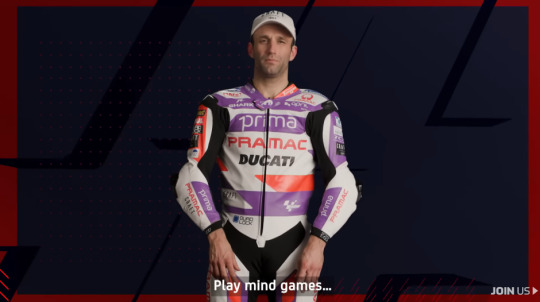
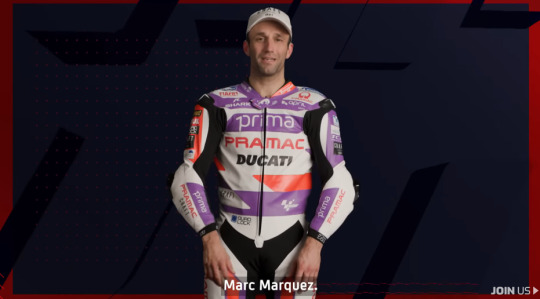
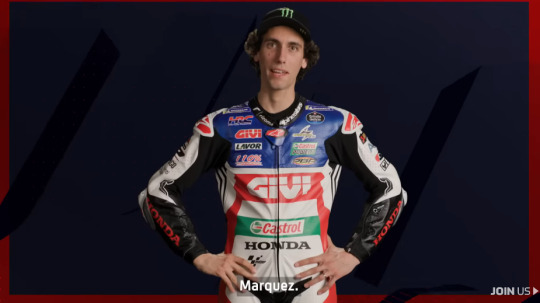
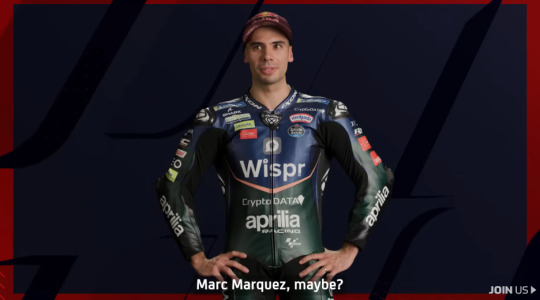
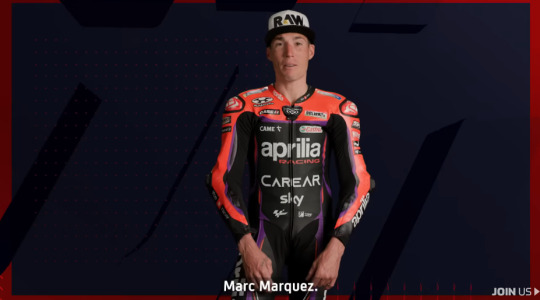
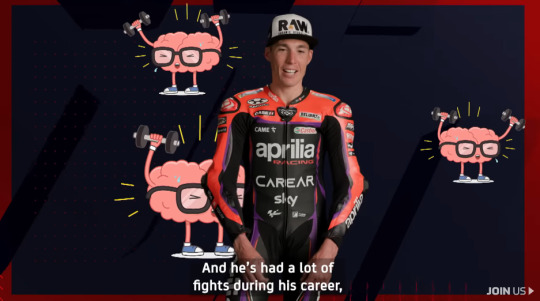
^'who's most likely to play mind games in a press conference?' winning here! alex rins hands on hips we will get to you in a bit
all that being said, we do have plenty of fairly clear examples of the ways marc tries to fuck with his opponents, so let's get to those. here are the elements I'll focus on: 1) an explanation of how the on-track exertion of psychological pressure works, in races as well as outside of them, 2) intra-team dynamics, and 3) some specific examples of how the on-track and off-track tactics are integrated. again, far from exhaustive - the examples are supposed to be more akin to illustrating marc's approach rather than definitively listing every instance in which marc has exhibited a particular behaviour. the streamlined approach, if you will
so, let's start with the actual racing. the aspect you bring up in the ask: the intimidation. bez doing his sad little crash out of p2 in the le mans sprint, maverick thinking it's so extremely over the moment marc came too close in the main race. I've edited this section down a lot to avoid getting too into the weeds here, but let's just give the brief sparknotes version of how this intimidation works:
speed: if you are not capable of performances that unnerve your opponents, obviously you will not unnerve your opponents. no shit. marc's sheer pace is terrifying in its own right... it makes you wonder if that cushy gap you have to him is quite as cushy as it looked a lap ago. how often he seems to be able to access something special, how it piles on pressure in the context of a title battle to know that he is fast pretty much everywhere. the speed does a lot of his work for him in the intimidation department, nothing fancy required
circumstance: so, say you've got an alien behind you. not to name any names... but there are some aliens where, if they are having a good weekend, they wouldn't be behind you in the first place. that doesn't mean the alien can't still be plenty scary... but when they're at their best, they're dominating out front and so are less 'threatening' when they're sitting on your rear tyre. when things aren't going their way in a given weekend, you maybe don't have quite so much reason to be worried. marc (similarly to valentino) is a lot more flexible in how he wins his races - which might mean he's looking very ominous from say p5 at the end of the first lap. there's less possibility of respite, less chance that if he qualified badly, he has the decency to still be slow come sunday. if you find yourself on the same bit of track as marc... that's probably not great news for you in any weekend
aggression: the obvious one. marc isn't as afraid to crash as everyone else is, he's willing to go for it if he's given half a chance - which he never fails to remind people of. he said it about half a dozen times at le mans this year, including with his competitors in the same room. convenient when you have such an immutable character trait you couldn't do anything about even if you wanted to, which also just happens to make you terrifying to fight with. sometimes he mixes up this rhetoric a bit - e.g. in 2016 after his messy 2015 he did talk plenty about his newfound maturity. still, not bad if his opponents are constantly reminded of how unyielding he is... which is of course part of the reason why he bangs on about it so much
(on the flip side, while it is obviously in his best interest to barely say a word against hard racing because it would make him come across as a massive hypocrite, marc has this nice little habit of reframing his opponent's moves as just not being particularly sensible in that situation. look at how he talked about the pecco portimao crash this year - sure, it's a racing incident, but it also wasn't "necessary" to fight like this for fifth/sixth place given pecco had a championship to consider. pecco's move was "too optimistic" - and, my favourite bit, he would "learn" from what had happened. which is nicely condescending, and a good way for marc to criticise aggression in a more circumspect manner: don't call your opponent dangerous, call them an idiot instead)
tactics: linked to the second point - part of the reason why valentino instantly recognised himself in marc and has always acknowledged what a clever and tactically astute rider he is. the other aliens to varying degrees tended to prefer the 'start fast and fuck off' approach to winning races. by contrast, it's hard to really pinpoint what an 'average' race win would look like for either valentino or marc. they are capable of the 'dominate out front' victory (marc historically more so than valentino), but they also have a bunch of other ways of winning races that all produce their own psychological effects on their opponents. to give a few brief examples, you've got the 'stalking and studying' approach, closely tailing opponents and gradually ramping up the pressure while you analyse where they're strong and where they're weak before eventually making your move. you've got the 'comeback ride', which is frustrating in how it means the field is basically never guaranteed a break from these assholes - this is all about relentlessness and generating a sense of inevitability. you've also got the 'fucking around before fucking off' approach, where you get involved in a scrap for much of the race and it looks like you and your opponent(s) are on equal footing... before suddenly pulling the pin and disappearing off into the sunset. there might be good reasons for marc and valentino to stick around that don't just amount to 'playing with their food' (though there is that too) like tyre preservation or figuring out grip levels in the wet or whatever. nevertheless, it's intensely demoralising for the competition, because it almost feels like the whole thing was a lie, an illusion of a fair fight... they've been tricked into thinking they had a hope of emerging victorious. obviously, all these different ways of winning are also investments for the future, so that next time your opponents are in xyz situation you generate uncertainty and doubt and preemptive frustration in their minds, as they wonder whether they can really get the better of you this time
now, obviously a lot of this is just about marc's natural strengths as a rider - but the point is that these operate on the psychological level as well... and you can gently encourage this with a little bit of extra off-track 'work'. what you say about your own aggressive riding, what you say about your opponents' aggressive riding, any impression you want to reinforce in the minds of your competitors. there's a lot of long-term reputation management involved here. (a little more about these reputations in the context of argentina 2015 in this post.) most of the 'intimidation' happens on-track, and it's also a result of deliberate riding choices that aren't just about winning any given race. of course, it's helpful if you are particularly adaptable to different race situations, if your flexibility allows you to reinforce the impression that you are always a threat. if successful, you can make sure your opponent is already mentally beaten by the time they know you're coming for them. (I'm not personally massively a fan of the term, but this kind of thing is what generally counts as the 'aura' an athlete has.) ideal, really - to be so intimidating your opponents can't even put up a proper fight
then, of course, there's the stuff that happens outside of races but in practise and qualifying instead. a perfect opportunity to be a dick to others on-track without the stresses of a race. which means... well, look, we can't ignore marc's habit of sitting on other riders' rear tyres when they're attempting to hook together a fast lap. the towing thing radically escalated when the honda was at its least competitive post-2020, but marc was definitely very much already at it before that. (incidentally, one of the cuntiest things he has ever said was when he pointed out in 2019 that he was leading so many laps in the actual races that he wasn't getting much chance to study the other riders there.) nobody really needs me to list every single towing-related controversy marc has involved himself in over the course of his career, but it might be a good idea to get the thoughts of somebody who knows a thing or two about fucking with his rivals. valentino himself has gotten the towing treatment a few times over the years courtesy of marc, and both pre- and post-sepang his stance has generally been 'listen it's a dick move but smart play, gotta hand it to him'. take this from catalunya 2019:





and y'know, he gets to the heart of the whole matter rather nicely -thanks to the local marc marquez understander for logging in years before the discourse about it became such a big thing. marc follows other riders around because it's a great way to study them and he also does it because he knows it's extremely annoying. it's annoying both because you know you're helping out another rider who you don't want to be helping out, and because it is just quite distracting to have someone that close to you, being able to hear their engine, etc etc. one thing that changed after 2019 was how necessary it was for marc to do this... marc went crazy with it at a time when it was often the only way he could put together a decent lap (and also because it played into the strengths of the honda, for a given value of the word 'strengths' - he's spoken a fair few times this year about how he finds it harder to follow other bikes on the ducati) (not for lack of trying). but valentino is also spot on in that marc is excellent at choosing his victims, how marc understands you have to pick someone who needs to put a good lap together and has no choice but to drag you along with them
I mean, think about why he just couldn't seem to leave poor pecco alone for a while there. first of all, pecco is fast, and marc clearly feels quite comfortable following him around. secondly, pecco tended to put himself in positions where he really needed a good lap because he'd gotten himself stranded in q1 or only had one more shot at a lap or whatever. plus he was fighting for championships, so he couldn't afford to fuck marc over out of sheer spite. thirdly, pecco has been fighting for titles for the past few seasons, making him one of the riders to beat. which means that marc was motivated to a) study him, and b) fuck with him - both of which were investments for a future in which he could fight pecco properly. makes complete sense! insanely irritating if you're the victim, which is half the point. also helps that pecco very obviously found the whole thing frustrating and tiring and really hated being asked about it, but also was equally obviously adverse to kicking up too much of a fuss about it for various reasons. the perfect victim
on the flip side, marc has been known in the past to be quite careful about who he is giving a tow, like for instance this from brno 2014 (ironically the first race that year marc did not win):
The two front row slots for the Ducatis were a problem for Rossi, dropping the Movistar Yamaha rider down to seventh, and the start of the third row. Rossi joked darkly about Marquez’s strategy, claiming that he was giving the Ducatis a tow to put them in between him and his main rivals. “For sure he is clever,” Rossi said. “He doesn’t pull Jorge, me or Dani, always a Ducati.” Marquez laughed at the suggestion, admitting only half of Rossi’s accusations. He certainly didn’t look for Ducatis to give a tow, but he would not give one to his rivals, he said. “It’s your decision to close the gas,” Marquez told the press conference. “If it’s Dani, Jorge, or Valentino behind me, for sure I will close the gas, but if it is another rider, it doesn’t matter.” That is in itself an admission of just how little competition Marquez sees. He is prepared to give anyone a tow, except for the other factory Honda and the two factory Yamahas. In effect, he is dismissing the threat from any other riders. Harsh, but fair.
and, y'know, if it were so easy then everyone would do it. you need a certain level of skill to actually pull off the towing bit, which marc is clearly very good at. you also need to have a good feel for picking your moments, who to bully, when to slot in behind them, all that kind of thing. and, lastly, you also need the sheer power of shamelessness on your side. which, that should more or less cover it... there are some real gems like mugello 2019 where marc accused ducati of ordering pirro to shadow him and then played a complicated game of chicken to catch a tow from dovi and snag pole, or mugello 2021 where marc was so determined to follow vinales through q1 that he was even alert enough to dive back into the pits with him as vinales tried to get rid of the small train of guys following him... but overall, I think valentino did a pretty good job at summing up the main points for me, so let's leave the towing discourse at that. returning to catalunya 2019, obviously it is also extremely valentino that he then had a sneaky little look at the honda's dashboard 'just out of curiosity'. truly a meeting of the greats, those two, we'll never find their like again
let's move on to intra-team fuckery - which is all about suppression of rivals. your first job is to beat your teammate, and the first arena of trying to fuck with your opponents is what happens within the team. my general assumption here is that marc's particular approach is less inspired by valentino and more just the result of his natural competitive instincts (which, to be clear I do think is true for much of the tactics described in this post). it's also not something... I know the ask specifies post-2015, but I don't think it's something that changed after sepang, except insofar as marc had won the most important teammate war of his career and didn't need to be quite as aggressive towards dani any more. given the continuity between the intra-team situation pre- and post-2015, I'm not going to make much of a distinction here and just rattle through some details about the intra-team dynamic from the start of marc's time in the premier class
so, the first bit of context that has to be acknowledged: a lot of the dani/marc war wasn't really fought between the two of them directly. both of them had... well, rather drama-happy managers, who a) were willing to do a lot of the mudslinging on the behalf of their charges, and b) were pursuing agendas of their own to establish themselves within the honda hierarchy. I think it's fair to say that not all of what they were getting up to was necessarily just about acting in the best interest of their riders - and it is an internal power struggle that could've had pretty disastrous consequences for marc in particular. here's a longer write up I quite like about the situation within honda in 2013, which came to a bit of a head with the phillip island fiasco (when marc was disqualified as a result of failing to change bikes early enough). just a few excerpts (though again I'd recommend reading the whole thing):
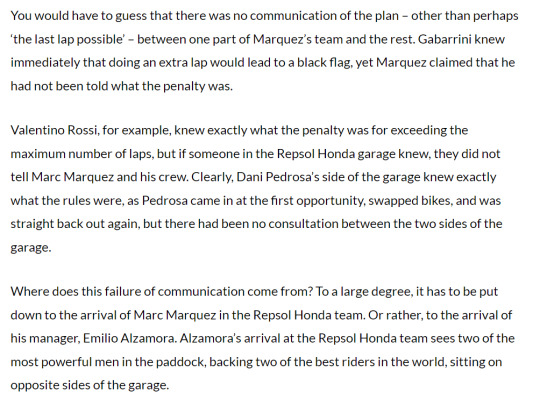
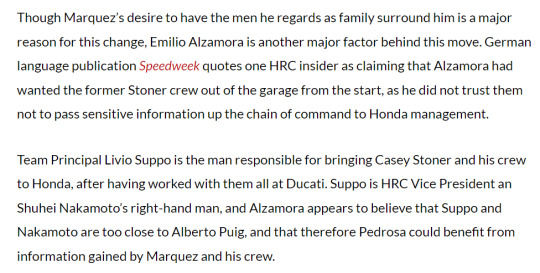
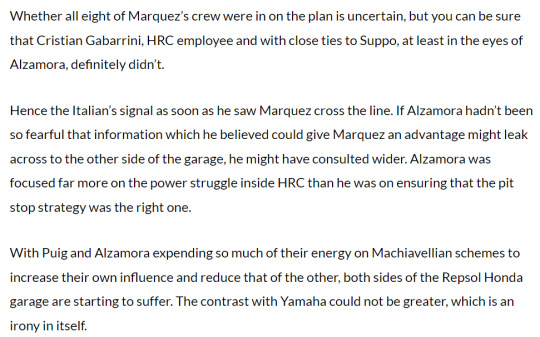
(gabbarini is pecco's crew chief these days by the way, small world.) so obviously a lot of this is kind of dumb, not least because marc came very close to losing that year's title to a yamaha rider as a result of all this behind the scenes bullshit. it also is just the kind of thing that happens when you lock a bunch of big egos into a small space within a competitive environment - and is a nice little insight into the early year machinations that were going on as marc and his team attempted to establish themselves within honda. which they did in part by pushing through key personnel changes that replaced anyone too closely associated with the old regime... and there's also the less pressing but interesting question of whether (as casey believes) marc's team pushed casey out the door because they felt 'threatened'. this sort of backroom manoeuvring is part of the game, albeit an unsavoury one, and great athletes do have a tendency to be ruthless in asserting themselves within team environments
of course, by 2014 marc was asserting himself ever more on the track. dani might not have yet fully accepted the number two status, but he was increasingly pushed into a position where he knew he had to play along, to not kick up too much of a fuss in his own best interest. did that perhaps play a role in how all those 2013 complaints about marc's aggressive riding - not least when it caused dani to crash in aragon and effectively ended his title bid - died down a little in the following years? who's to say! of course, marc has been pretty open in admitting his abrasive approach to the teammate dynamic, which he was kind enough to shed some light on more recently in marc marquez all in. I assume pretty much everyone reading this will have watched marc marquez all in, but for reference I've still included a transcript of the relevant bits of marc marquez all in. here's marc talking about the teammate relationship:
Dani and I, now we get along great, and he's an amazing person. But in 2013, 2014, there was a lot of tension. He was the king, the number one. People listened to what he said in the box. Everyone expected something from him... The team was focused on him. And out of nowhere comes this kid. A kid in his first year after Moto2. And well, first race and... boom. Second race, boom. And it's a hard pill to swallow. [...] I've never been a nice teammate. I've always liked to... You've got to make your teammate's life impossible, if you can.
and dani's take:
Those years there was a lot of tension because we were fighting for the same thing. He knew about my potential. That's why he always tried to stick to me, so I had no space to really take off. [...] He's very competitive. That's his strong suit, how competitive he's always been with everything.
and then at the end of that segment, marc says the following:
It is true that after 2015, 2016, everything calmed down, and we had a good, normal teammates relationship. After a while, I think you learn to accept the situation, right? It happens, and I'm sure it'll eventually happen to me too.
which I suppose is a fairly diplomatic way of saying the relationship got better when marc had won the war and dani had to 'accept' his lot in life. the king is dead long live the king, etc etc. intra-team competition is perfectly natural, but of course that doesn't mean all riders approach that dynamic in the same way. dani's "I had no space to really take off" is a nice way of putting it I feel, how he talks about marc 'sticking' to dani, marc's determination to just continually work away at his teammate... to suppress him, to smother him, to ensure that not only was marc winning the war but he would keep winning the war. marc made that team his own and he ensured that dani's continued presence in that team was happening on marc's terms. a job very well done
marc is also remarkably open in describing one of the specific tactics he utilised to achieve the desired effect in suppressing his teammate. in marc marquez all in, he admits to intentionally giving misleading bike feedback when it could give himself an advantage over dani:
But back then we had a great bike, everyone worked well. So if a replacement piece worked for him, I didn't like it, "This doesn't work. I want this one. I want this replacement piece, since I'm leading it. I want it. Don't give him this." "You want to try it?" "Yeah, sure." But I didn't want to.
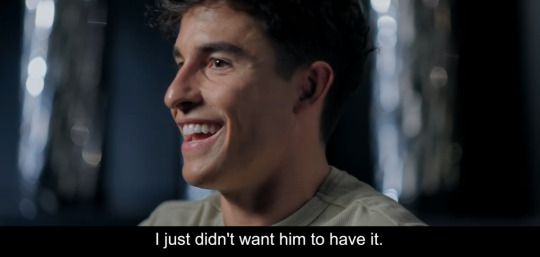
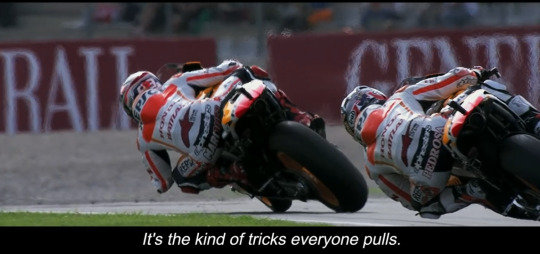
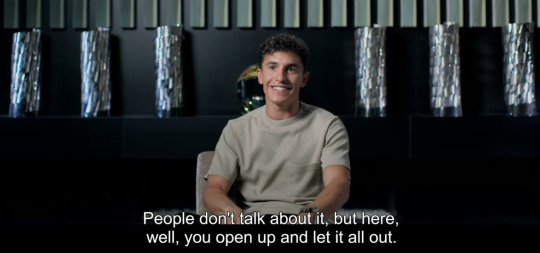

now, listen, I'm sure this kind of thing does happen. that being said. marc, come on, not everyone is engaging in this degree of underhanded behaviour wherein you're intentionally hampering your teammate's efforts to improve the bike just to ensure you continue to have an edge over them. let's make a casey stoner comparison, given that I am legally obligated to mention him in most of my posts. he is actually relevant here though, as dani's pre-marc teammate and the bloke who would have more likely than not been marc's teammate if he hadn't retired. casey talks a bit in his autobiography about working with pedrosa at honda, mentioning how it was nice to have a teammate with a similar pace so they could actually develop the bike together. he also says this:
I never felt threatened by a teammate because I have never had one that I felt was consistently quicker than me and throughout my career our biggest competition always came from outside the garage. Still, I have great respect for Dani, our partnership was a fruitful one and I think we worked really well together to help Honda build their best ever bike in the RC213V.
while I do quite like the implication that casey would have felt 'threatened' by any teammate who could match him, I think it's fair to say that this is a pretty different approach from what marc's describing above. of course, casey could be misleading us... but, call me naive or gullible or whatever, I really just don't think casey was pulling that kind of shit on his teammates. I'd go so far as to say that this kind of thing is maybe not quite as widespread as marc portrays it as being. it might also be worth quickly bringing in casey's thoughts on such a combative style of teammate relationship (from 2009):

probably for the best we never got to see how that particular teammate dynamic would have played out! also, luckily enough, we do actually have somebody who can corroborate that casey and marc behaved differently as teammates. let's get the thoughts of dani himself (april 2023, so after marc marquez all in had been released):
“At least in the team we were in, HRC, it was like this: the one who goes the fastest is the number 1, the one who chooses the parts and the one who determines the direction a bit. “When [Marc] arrived, I was in that position and with the races and the championships he took that position and decided in his own way. When I was directing more the evolution of the bike I had the parts first and I never thought in [my] own way. “My way has always been to do the best for the team, and if I have the best parts to make the bike the best, I'm not thinking about my rival right next door, but about Yamaha, Ducati... whoever the rival was, because I consider myself part of the brand. Later he had that other way of doing it. “I don't think I was missing [the same way as Marquez], because my way of being was that one. For example, before Marc came in, with Casey Stoner, he never played that game either."
so, yeah, maybe not completely universal behaviour. I don't know, I do find it kind of charming that marc has this very 'ah well everyone does it' attitude. now quite honestly I personally would not admit to this sort of behaviour even in confessional amazon prime documentaries - and it's fascinating what kinds of things he has a filter about and at what times he just decides to be, uh, very candid. I mean, I suppose this is a nice way of publicly forewarning any teammate who isn't your brother that you're going to try and make their life miserable. so that's something. anyway, marc did obviously win the internal war - which is the kind of thing that does matter if you're trying to impose your will on bike development... even if you're just doing so to fuck with your teammate. so by 2016 you reportedly had a situation where marc's direction was being followed to the extent that it harmed all the other honda riders:
But Pedrosa claims he had no input in the decision, and is now paying the price of having to compete on a bike built around Marquez’s preferences. The 30-year-old also said that he knew he would be in for a difficult time in 2016 as early as the Valencia test last November. "In the end we didn't have many specs [of engines], but out of the ones we had I wouldn't have chosen the current one,” Pedrosa admitted. "When we picked the bike I already knew things would be very hard. I already knew how the bike handled in November. But it is what it is. The choice of bike that we have was [Marquez's], I had nothing to do with it. For the moment, he's ahead and he deserves to be. He likes the bike, he adapts better to it, while I struggle more. That's obvious, you can see it in the results and in the way we ride." Pedrosa said the poor performance of Honda’s satellite bikes this season in comparison to previous years was yet further evidence of how the RC213V has been designed around Marquez’s needs. Cal Crutchlow’s sixth place at Catalunya has been the best result for a Honda rider besides Marquez and Pedrosa of the campaign so far. “You have to think of the team, not only about yourself,” Pedrosa added. “If you look at the rest of the Hondas, they are a lot further behind than two or three years ago, when you had [Stefan] Bradl or [Alvaro] Bautista finishing fourth or fifth. Now they are 10th and further [back]. So we have to try to get the other teams to work too."
obviously, to some extent teams following the lead rider and prioritising their feedback is completely natural and even wise - they're the one who is winning for you. it does also end up being a bit of a self-perpetuating cycle that makes the rider already winning more likely to continue winning, which helps explain why these riders are even so invested in their internal bickering. all that being said, of course it's worth noting that different riders conceptualise that teammate relationship differently, and the extent of intra-team cooperation can vary drastically. marc has a very particular understanding of that relationship when he is paired with anyone who is not his brother - one that is generally speaking pretty far along the combative end of the scale
unfortunately, we never really got to see how bad the whole marc and jorge (also not the easiest of teammates) situation could have gotten. in 2018, their relationship was definitely better than say 2013, but also jorge was still perfectly happy to criticise marc - whether after argentina, or that whole aragon incident they had

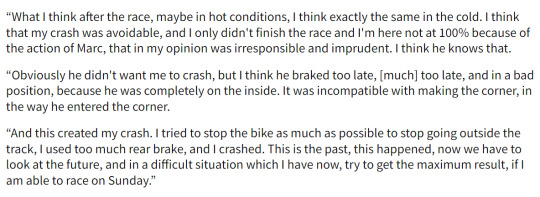
(marc did call jorge afterwards to check in on him, which jorge did appreciate.) but jorge never had the pace in his honda days to threaten marc, so nothing really got going between the two of them. if memory serves, the closest we ever got was catalunya 2019, where they had a bit of a coming together in practise - incidentally the first (and in retrospect only) weekend that season where jorge had potentially dangerous pace
But Lorenzo’s apology seemed to clear the air. Marquez explained that once he “was calmer” and the fear of dropping outside the all-important top ten had subsided, he could see the #99’s point of view. Marquez also noted how he was twice penalised in 2018 for similar actions to Lorenzo’s in FP3. He then pointed out how neither his team-mate, nor Joan Mir, who blocked the reigning world champion at one point during the Mugello weekend, were punished. Speaking to Spanish journalists after Saturday’s press conference, Marquez, said, “He [Lorenzo] apologised to me, because he was in the middle of turn three. While people can say it's only free practice, it was the third one, in which the last laps are like qualifying. “I was so angry because I knew that my lap was the one to enter Q2 directly. In the end I finished ninth, the worst classification of the year. It’s clear that last year I was twice in the middle of the track and on both occasions I was penalised. At Mugello I came across [Joan] Mir, we touched and everything and then at the end of FP3 it happened again with Lorenzo. But this happens... When it does everyone has to be judged equally. There is no difference. He simply apologised. Logically [after the session finished] I was calmer and I understood, because no rider waits in the middle of the track – or at least I hope they don’t."
obviously, this isn't like, a big deal, but in the moment it was one of those 'oooh maybe this'll go somewhere' incidents and the eternal drama enthusiasts in the commentary box were talking about it at the start of the race. like I said, that was jorge's first honda weekend where he was showing actual pace, so it felt like this might be building to something. except then, uh, jorge decided to skittle all of marc's rivals in one go in the race itself and somewhat hilariously managed to just miss marc. and then jorge got injured again the next race and it all just kinda fizzled out after that, so we never really got to find out what dramatics could have been possible there
and that's it as far as teammates prime!marc had in the premier class go. childhood rival pol espargaro took on the mantle for two years in 2021-22, at a time in which there was much kerfuffle about honda's development direction and whether they'd followed marc's path for too long. espargaro did attempt to assert himself in that team and they did try to develop the bike in a way that suited all the riders better rather than just marc, which *gestures at honda post-2020* worked insofar as marc also ended up in the trenches. that being said, pol was never a particularly serious threat to marc - aside from that one race to start off 2022, which maybe prompted a little bit of needle from marc (based on what the podcasts™ were saying at the time in any case) but nothing dramatic - so, y'know, that was kind of that. in those two years plus the year where marc had joan mir as his teammate, of course you can go into the weeds and dig out minor disagreements... but apart from the conversations around development direction and how marquez-centric honda should be going forward, it's just a bit of a different vibe when you're beefing for pee one million or who gets to be the leader of that year's crash rankings. of course, if you really want to stop marc from tormenting you, maybe you should just try being his literal brother. pecco, if you want any more useful advice like that: I offer very reasonable rates, just give me a call and we can hash something out
so, we've covered how the on-track stuff works and looked at the intra-team dynamic - what's next? time to explore a little more how marc goes about unsettling his rivals, how he attempts to give himself the decisive edge over his opponents... and also, what purpose this all serves when it comes to his own psychology. intimidating rivals typically has another underlying goal: it's about motivating yourself. it's about proving to your rivals just how far you'll go to beat them while proving as much to yourself in the same breath
again, at times we're a little light in terms of an actual paper trail of this intimidation... given that marc does like to take on the role of the aggressor in on-track disputes, often he doesn't even have to be the one to comment - and instead the onus is on his rivals to voice their dissent. there's also the issue that marc did have a paucity post-2015 in terms of 'serious title threats over the course of multiple seasons' - which, I don't know, this does feel like a thing somehow, you just don't really build feuds in a single season. even valentino, known feud enjoyer, always needed a little longer to really get something going. looking at marc's career, obviously you do have dovi, with whom he had a very cordial rivalry between 2017 to 2019... but the only year in which dovi was a serious title threat was in the first year of that rivalry, in 2017. after dovi's poor results in the first half of 2018, that title bid was essentially dead on arrival, and the 2019 title fight generously lasts until catalunya when jorge skittled the field minus marc. there's a couple marc rivalries with young challengers that looked like they were just about to kick off after 2019... but, well, we'll never find out how those would have played out. and it might be worth pointing out that in his prime, valentino's disagreements with riders who weren't serious threats to him winning titles didn't really go beyond what marc had going on with assorted other riders from 2016 to 2019. it's a bit of an open question if you want to attribute marc's lower number of feuds primarily to his actual personality and how it differs from valentino's, or whether you think it just reflects their respective competitive situations. the boring answer is that it's probably a combination of both of those things
that being said, obviously you can engage in a wee spot of psychological warfare without it escalating to feud level. now, let's get the obvious out of the way: marc and valentino were still very much at it post-2015. of course they continued to be deeply invested in their attempts to undermine and mess with each other. but, let's be honest, they're their own special little thing and it's just going to derail this post if I pay too much attention to them. there's a certain level of feuding where it becomes increasingly detached from any sort of actual competitive calculus and is more about a fraught relationship between two people who have managed to severely hurt each other. that being said, it's worth pointing out that marc was perfectly capable of using that feud to spur himself on. for the easiest evidence of that, just look at some of his misano performances... in 2017, valentino had just nerfed himself out of the title fight, whereas in 2019 he was no longer a serious threat to marc on-track. and yet despite how valentino wasn't the on-track rival marc should be concerning himself with, in both cases marc ended up using his valentino-related rage to find that little bit extra within himself in order to steal the victory
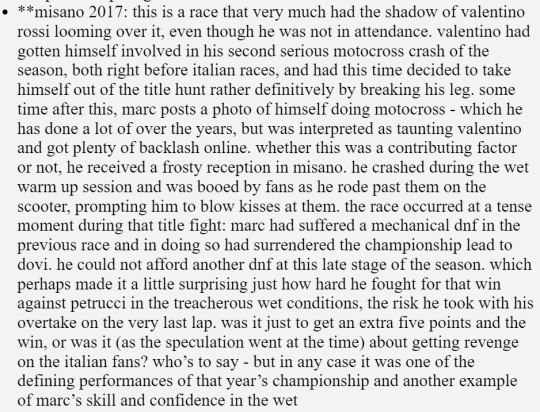

^from the marc (+ dovi) race rec post
there's plenty to be said about the misano 2019 qualifying incident, but let's set aside the specifics for now (though, speaking of towing-related drama, marc had again during fp3 shadowed valentino around the track, which... why are you hounding this man in misano of all places, marc). the whole kerfuffle certainly didn't hurt marc's race performance, and it's fair to say he seemed particularly thrilled with that victory. obviously, these were pretty pointed celebrations, very in your face, big fuck you to the nation of italy and valentino rossi specifically. celebrations like this are important in both what they're signalling to the enemy and what they're signalling to yourself. if there's one thing you can learn from valentino, it's that a celebration is a public message, and can function as a statement of sorts about what the victory 'meant'. what's the story you're telling with your victory? what do you want to take away from this race? what do you want your opponents to take away from it?
misano that year had come after marc's struggles in last lap duels, with the two races directly preceding it featuring last lap losses to dovi and alex rins respectively. now, on the one hand it's not always catastrophic on a psychological level to be constantly losing last lap duels... because in marc's case they did help reinforce just how dangerous he was, where even at his weaker tracks he would hound his rivals until the very end. on the other hand, obviously it's preferable to have a reputation for winning last lap duels as opposed to losing them - not least because it adds to how intimidating you are when you are locked in another last lap duel. valentino of course had a reputation for being lethally effective in that sort of situation, and it's nicely helpful if your enemies assume they're fucked when you're in their postcode with around three laps to go. I discussed this dynamic a little bit in how it relates to the sete rivalry here and here, which links back to the discussion of how you exert psychological pressure on the track. some relevant excerpts, plus some of my race notes:



marc is obviously more than capable of adopting similar tactics in his racing, but the sete rivalry still holds up as a really good demonstration of the kind of rewards you can reap through a steady diet of psychological intimidation. this is why it's so important to keep an edge over your rivals: you want them to be haunted by the ghosts of all your past on-track encounters whenever you're fighting to the point where it's detrimental to their actual riding. anyway, let's quickly check who marc was actually fighting with during the last lap of misano 2019, and whether that might have had anything to do with why marc was so thrilled to get the victory. oh, the rookie revelation of 2019 and the guy marc quickly identified as the big big threat of the future, you say? poor little fabio quartararo who still hadn't won a race yet, but who marc managed to dramatically deny on two separate occasions that year on the final lap? getting in early on the mission of building up some crucial psychological baggage, are we now?
obviously, and pretty tragically, this future investment on marc's part has ended up being completely irrelevant (unless yamaha wants to do something so so crazy for me and build a functioning bike before marc's hair goes grey), but equally obviously none of us knew that at the time. and fabio was able to take away some positives from the misano experience:
“I knew he would try something, but you never know with Marc,” said the Frenchman. “He can overtake and pull away because I really don’t know if he really saved his tyre. “The good thing was I could overtake him back, and this going home gives me a lot of confidence, to say ‘he’s a seven-time world champion, but we can overtake him’. So, he’s a human like us.”
because that's what it's all about, isn't it. giving the opposition the impression that you're not even human - and, even if fabio is saying the experience gave him 'a lot of confidence', imagine how much more confidence he would've gotten if he'd won. also, check out fabio's comment about not knowing whether marc had been saving his tyre. that's why the 'fucking about before fucking off' approach to races is so effective: because of how it generates uncertainty, it generates doubt, it makes your rivals wonder even during races whether there's a chance you're just toying with them
we do have a bit of a sample size issue here when it comes to assessing marc's celebrations, in that his two last lap duels with fabio came a) in valentino's backyard, and b) when marc sealed that year's title. it means that if the celebrations seem excessive, there's still other plausible explanations for why marc was so happy to get one over the rookie that aren't related to trying to bully fabio into submission for as long as he still could. did marc really use them as a way of reminding everyone, including fabio, including himself, of who's really in charge? again, you'll have to draw your own conclusions
I'm doing my best not to cover anything that's happening this year too much, since this is the stuff I'm assuming people reading are basically familiar with. but of course, if we're talking 'pointed celebrations' then there's also a few from this year that stand out. this isn't to say that marc's joy at his ducati successes have been anything other than genuine, that he isn't happy or relieved or revitalised by his current season... but, well, part of being revitalised is also being back in the game where fighting for titles is concerned. take the jerez celebrations, ecstatic in spite of losing a tight battle, openly loved and adored by his home crowd. look at how he's done his thing repeatedly this year of engaging with all these crowds, getting them to celebrate with him specifically. a cynic might say it's a way of reminding his opponents that they might be winning right now... but they should never forget who the crowds have really come to see. which would be charmingly valentino of him. while marc (probably wisely) never went too far in mimicking valentino's unique style of celebrations, he is an avid enough student to understand the importance of the theatre of victory. like in his third ever premier class race (from the jerez post):
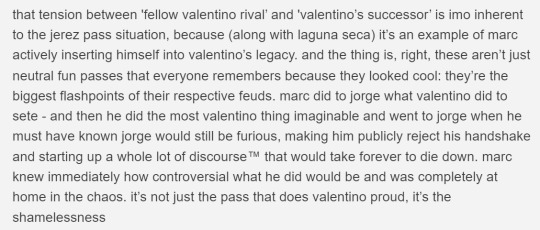
racing is one thing, but it's always important to consider how you're reacting in both defeat and victory. like valentino before him, marc prefers not to openly show his rage. like valentino, more often than not he will be publicly magnanimous in defeat. like valentino, he's not adverse to twisting in the blade a little further in victory. like valentino, he's very much aware of when a camera is watching him. with marc, you can also observe how determined he is to appear unaffected and unbothered by the effects of sepang 2015 on his public image (except in displays of very carefully managed vulnerability like marc marquez all in). there's plenty of examples of this, but most relevant here is how marc concerns himself with not being openly affected by fans booing him. take blowing kisses to the misano 2017 crowd after his warm up crash... which, looking at his post-race presser comments, whatever he may say clearly (and understandably) did bother him. likewise, see the glee of the misano 2019 celebrations. with those celebrations, he's trying to tell you that not only does it not bother him that they're booing, but instead he relishes it. the more they do this, the more he will win
one more case study before we wrap this post up, this time using a specific rival to illustrate some of his more common tactics and how the spats he gets himself involved in generally play out. said rival is alex rins, who especially in 2019 had emerged as one of marc's prime challengers. now, before we talk about any disagreements between those two, I do have to mention that rinsy has a bit of history with the marquez family (this from 2016):
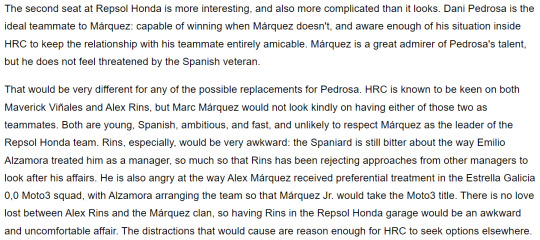
in the end, dani stayed on for another year and was replaced by another ageing spaniard marc felt confident he'd have the measure of while rinsy signed for suzuki - so it's very unlikely marc had to play any active role in blocking him from taking the seat. that being said, obviously the main takeaway is the bad blood stemming from alex marquez's moto3 title campaign and how alzamora organised that team around the younger marquez. god knows how rins felt about this by 2019, but I doubt he'd just forgotten about it. there's also this from 2020, which to me reads as a little dismissive about someone who was your teammate in moto3? I don't know, judge for yourself:
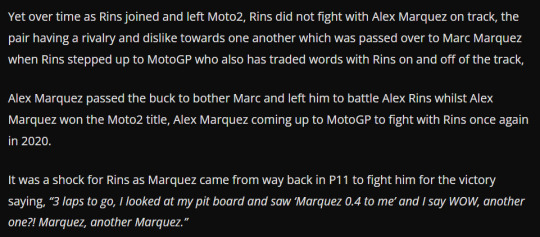
anyway, back to marc. the 'biggest' incident between the pair of them was a coming together in qualifying at brno 2019 (one of the all time great qualifying performances from marc by the way, well worth a watch):
During qualifying at Brno, cameras picked up the end of a tense tussle between MotoGP champion Marc Marquez and Suzuki's Alex Rins. The pair were caught putting some close passes on each other before pulling into pit lane, where they continued to 'duel' - until Marquez reached out with his arm to put some space between their machines. Marquez then over swapped to slick tyres and romped to pole position on the drying track, with Rins claiming sixth on the grid. "It's a tricky thing because for sure [Marc] is now one step in front of everybody. He put the slick tyres and he was super-fast. But I think he has no respect for the other riders. He is riding on his way," said Rins. "I will explain to you what happened: On Corner 5, he went a little bit wide and behind him was Miller and me. When he went wide, he looked back and saw Jack and me. Jack passed him, but then he went back onto the line and sincerely he disturbed me. I was pushing. I was not super-fast, but I was pushing. "So on the next left corner I tried to do my line. He opened a little a bit the door and I go in. I touched him, but I think it's his fault; if he is riding slow he needs to open the door and that's it. But anyway, then on the last corner he braked super-hard to overtake me [back]. Then when we were coming into the box I was in front of him and I go straight and he has no space to go by my side. If I was him, I would cut the gas…" "I ran wide at Turn 5 and Jack overtook me because I checked behind and I only saw him, so I tried to follow Jack because I know he had good pace. Then I went a bit too wide and there was a small space, but enough and [Rins] ran into me…" said the Repsol Honda star. “The funny thing was when we entered the box and the tyre wall was there [in front of me] and I didn’t have the space [to get through] because he was going that way. I don’t know if that was intentional or not, but for me it wasn’t important. I lose zero time on these sort of things.” Told Rins had said he had no respect for other riders, Marquez responded: “Of course I don’t agree with this, it is his opinion." "It's not the first time," Rins had explained earlier. "Everybody knows Marquez and everybody knows that he has an incredible talent, but also what happened in FP1 with Vinales was more-or-less the same. Marc loves to play this game and try to get in the head of other riders. But in my case I'm really calm. I just tell the truth and that's it." Asked if he thought he needed to try and get into Marquez's head, Rins responded: "No, I don't think so…. For sure if I'm fighting for the world championship with him I will try to do something, but he's 80 points in front of me - maybe he's scared, I don't know!" Austin winner Rins, who has fallen in the last two races, is fourth in the world championship.
their most significant race clash was in silverstone 2019, where alex got the better of marc in a very dramatic last lap duel. I've heard journalists make vague reference to marc not taking that loss particularly well, though... again. hard to actually pin him down on a lot of this! but we do have more extensive comments rinsy provided in early 2020 to work with, and he at least seems to agree with that assessment:
"Marc is so good at these mental things, he plays a lot with all the riders," Rins told the official MotoGP website. "For example in Brno last year, I was on a fast lap, he looked behind at me and opened the line a little bit, but not too much. I was on the dry line and I touched him. I lost my lap, but I continued pushing. Then in the last chicane he overtook me so closely, we were so close to a crash, and then he went into pit lane. From that moment, I said to myself, Marc is considering me as a rival." Rins - who declared "Marquez has no respect for other riders" immediately after the incident - got his revenge in the form of a thrilling last-corner victory pass on Marquez a few weeks later at Silverstone. "Marc is the man to beat and the rivalry is so high," Rins said. "More in 2019, because I shared more moments on track with him. For sure whenever he finishes just in front of me, I'm a bit angry, I want to beat him. But also for him. I remember when I beat him in Silverstone he was so, so angry." Rins added: "I like this because it means that I'm doing a good job. Marc is an incredible rider, winning a lot of races and championships, and if he thinks of me as a rival, it means I'm there fighting him." Rins took two wins on his way to a best-yet fourth in the 2019 MotoGP standings.
now, yeah... the problem is that this is all very much hearsay (but no more so than plenty of similar comments valentino's rivals made about him!) and rinsy could just be lying about this or misinterpreting it or whatever. we are very low on actual evidence for the stuff he says here. if you watch silverstone 2019 and the aftermath, you will not see a marc who visibly looks angry - of course you won't, because he almost never looks visibly angry. unfortunately, we don't have the chance to grill alex on why exactly he was left with this impression. at the end of the day, like with valentino, when it comes to evaluating the honesty of a lot of these character references you will just have to make up your own mind. like with valentino, some of these men will either be exaggerating the extent of the harm or just straight up making shit up. then again, like with valentino, the number of people who do seem to have the impression marc was fucking with them maybe suggests that there is something to these allegations
just a few things to note here... to highlight some of the common features that tend to crop up in these marc incidents:
there's the accusation of lack of respect towards other riders - valentino is the one who most infamously made that accusation in the aftermath of argentina 2018, but of course he's far, far from alone in making comments along those lines. marc certainly has a tendency towards being... uncompromising in his approach, shall we say, which can at times lean towards treating his competitors mainly as obstacles and inconveniences
the anger that's being attributed to marc. which he doesn't tend to directly express towards his competitors off the track! but if he is angry, it may instead... seep into how he approaches instances where they share space on-track, as well as affect his general demeanour towards them
there's rinsy suggesting marc is known for playing these games, that he does it a lot, and he's also known for being very good at them... which again is often something we only hear about indirectly, but of course it's interesting if that's the general paddock consensus
there's also rinsy's insistence that marc's games don't bother him at all - he's just calmly noting that marc's engaging in them! again, it's quite hard when you're familiar enough with valentino's oeuvre to not be slapped in the face with the similarity in some of the rhetoric their rivals use. doesn't mean all of these different dynamics are directly analogous, but it does speak to how determined the rivals in question tend to be in... y'know. telling themselves that they're above the whole thing. unfortunately, sometimes it is just very, very hard to be unaffected... and sometimes you're already losing by talking about it, because it shows you've been thinking about it
which, check out marc's response. 'oh, obviously I don't agree I lack respect' 'ah, I lose zero time on these things' (for another example of him using similar language, you could of course look to his comments about bez last year in valencia). this is marc's go-to - he generally quite likes to deny the existence of a problem, makes it sound like the whole thing is very one-sided... he keeps his distance and can maintain his poise and this veneer of neutrality, where he is not causing any drama. maybe the other guy's just imagining things! that's really not marc's problem, is it now
lastly, you've got this notion of marc messing with other riders selectively, and specifically doing it when he's identified you as a potential threat. again, maybe you think alex is reading too much into it! but equally, it's worth noting that we have as much evidence for marc messing with rinsy as we do for, say, valentino messing with casey in practise sessions in 2006 (as casey's autobiography claims). it would have been completely competitively reasonable for marc to identify alex rins as one of his primary threats in the future... and it would also not be hugely surprising if marc wanted to maintain a psychological edge over him
incidentally, at 2020 jerez rins and marc had another little run in during a practise session - where alex was left 'visibly frustrated' after marc was slowing down on the racing line while rinsy was completing a flying lap, which he ended up having to back out of. this denied rinsy direct entry into q2 (though marc didn't end up being penalised for it). of course, marc's jerez race reached an unhappy conclusion and rins was too injured to even start it, and after that they've never been even remotely close to fighting for a championship. though there's still a little bit of needle between the pair of them, mainly resulting from how rinsy ended up joining lcr honda in 2023 after suzuki departed the scene. there's marc's reasonably innocent comments in 2022, on a day in which rinsy won another last lap duel for the victory in phillip island:
"I will not give any advice," said Marquez. "For me it is another opponent. It’s good that joining Honda is one world champion [Joan Mir] and one rider that is winning races with another manufacturer. "Like this we will see exactly the level. I’m working really hard for the 2023 project with Honda and they are working really, really hard too. I don’t say I wish [him] the best. Let’s just go and see. He is another opponent, if not it would be fake’."
or here, take this from before mugello 2023, again mostly innocuous:
By contrast, Marquez believes Mugello is one of Rins’ best tracks and he wasn’t surprised to see the COTA winner at the sharp end. “No [I’m not surprised], because Rins, even with Suzuki, had 5-6 circuits where he is very fast and then others where he struggles more. Normally here with Suzuki, he was very fast and very consistent,” said Marquez, whose only premier-class win at Mugello was back in 2014. “He is really good in fast corners so, for example, in Le Mans he was struggling more than me and here he is very fast. It is good for Honda and Honda riders that someone is faster because like this you have more chance to look and compare the things.”
love being told I have "5-6 circuits" where I'm very fast. or take rinsy's innocent surprise that marc didn't end up winning at the sachsenring, and how he suggests it was maybe because of all the pressure marc had been feeling:
"It's hard, it tastes very bad to me because Marc has a fucking talent and it's not being easy at all,” Rins was quoted by DAZN. “But hey, in the end you have to turn the tables, you have to win, you have to build a winning bike. "Damn, I thought that Marc would also win in Germany. What happened? I don't know, I have no idea. Pressure, extra pressure, I have no idea.”
and then, of course, there was always that little hint of tension that came as a result of rinsy being honda's only race winner that year, at marc's beloved cota of all places... which became a bit of a discourse point (not always propagated by rinsy) to say that, hey, maybe the honda wasn't so bad after all... anyway, here's what marc said when rinsy signed for yamaha:
Repsol Honda rider Marquez was asked about Rins’ departure and answered: “I had an interview, they asked me about this rumour. I said ‘I don’t think so’ because Rins won a race and he said ‘it’s a good bike’. “So I didn’t expect this move. But then the day after! I’m happy for him, it’s a good move, he’s moving from a satellite team to a factory team. Yamaha has power and energy from the past.”
marc had said 'surely not' but then the very next day he was left shocked and taken aback! he'd thought rinsy loved the bike so much! he'd thought rinsy felt it was actually a good bike! he'd thought rinsy would never want to leave! how unexpected this whole thing was to him!
(there was also talk about rinsy's unhappiness at how honda treated him and his development feedback - but as there is less than zero evidence marc had anything to do with that, let's leave it there)
did marc really behave differently towards alex rins because he saw him as a threat? probably! possibly? probably! but he hasn't really felt the need to say as much. sometimes, you can fuck with people by staying silent, and sometimes you can fuck with them just because you have a reputation for mind games - which marc, like valentino, has acquired over the years. ideally, your on-track plus off-track presence gets to the point where you don't really need to do anything and can let your opponents engage in shadowboxing while you can spend your time in more useful ways. think of that excellent clip from motogp unlimited where poor joan mir complains about marc's towing, freaks out when he realises the press has said he's complained about marc's towing, and then goes to explain to marc how he hadn't actually complained about marc's towing. and marc, with the air of a man who has been high on painkillers for the past week and hasn't given joan much thought beyond contemplating how well he'd pair with potatoes, graciously accepts this explanation - which joan is painfully, obviously relieved by. marc wasn't playing any 'mind games' in this clip, he was just standing there. but sometimes that's all you've got to do! call it a good return on prior investment. (partly this is also just a result of the status the sheer extent of marc and valentino's successes provides them and, relatedly, their power and influence within the sport.) here, from one of oxley's books:
Once you've established a reputation for trickery, you can confuse people without doing anything. At this year's [2009] German GP Casey Stoner accused Rossi of attempting to confuse his rivals by scrubbing the white sidewall paint from his front slick; the paint denoting Bridgestone's softer compound tyres. In fact Bridgestone had run out of white paint (no, really), but the reality didn't matter because Stoner was sat on the grid, convinced Rossi was playing tricks when he should've been getting himself in the zone, focusing on his race.
that's the ideal, right: you don't even have to do the dirty work yourself because it's the reputation doing the work for you. marc inspires a similar effect on riders, where he just gets them to the point where they're spending way too much time hyper-analysing whatever he's doing at any given moment. which means that he doesn't actually need to be trying to fuck with anyone for the effect to still be the same. free and easy, what's not to love
so, that's it, more or less. all the on-track stuff, from 'how to build up an intimidating presence 101', to just being extremely annoying in non-race sessions, to trying to mess with your teammate, to more generally how you go about handling disputes with other riders. managing your motivation, their motivation, everyone's motivation. of course marc's not quite scaled the heights (yet) of cursing another rider to never win another race again - which, hey, nobody's perfect, but I think he's built together a fairly decent resume for himself! there's plenty more stuff you could get into here, c.f. 'everything that's been going on with ducati internal politics this year'... but this post is more than long enough, and you can follow all that stuff while it's actually happening. a few more related topics I've deigned outside of the scope of this post include how he generally manages perceptions of himself and his performance potential in ways that aren't targeted at any specific rival, for instance how he talks about his injury and has a tendency to change his tune depending on what's convenient at any given time, or how in the past he managed perceptions of the competitiveness of his honda package. likewise, I also haven't discussed the actual success rate of these tactics: let's not forget that trying to fuck with your rivals doesn't... always produce the effects you want it to. (sometimes just in kind of dumb ways, like I get messing with the rookie sensation but please try not to crash when catching a tow, marc. "marc clearly tried to get into fabio's head and I think he hit his head himself quite big." "so, I think it's karma. fabio's on pole and I hope marc is uninjured of course. but he tried to get in his head because he knows fabio is fast." not ideal!) but, hey, the most important thing is he's trying hard and having fun. or something
because that's the thing, right. when you are attempting to exert psychological pressure on your opponents, when you're trying to weaken your rivals, inevitably this also has an effect on you. there are athletes who prefer to completely ignore their opponents and act as if they are essentially competing on their lonesome. neither valentino nor marc fall into this category. as a result, how you behave towards your rivals inevitably also becomes at least in part about motivating yourself. you are attempting to focus your mind in some way - whether it is to see your rival as an enemy or to simply distance yourself from them or otherwise. you may even be minded to treat your rival particularly warmly, knowing they are less likely to give you grief if you have ensured the interpersonal relationship has remained amicable... maybe even looking for a slight psychological edge if they are not sufficiently motivated to beat you. maybe that too is about managing your reputation and drawing a line under past unfriendlier rivalries, to distinguish your most beloathed rival from all the others. you may need to find a way to keep the fire within going, to reinvigorate yourself even in periods of relative competitive tranquillity by giving yourself something to be angry at, a reason to fight and to win out of spite... finding reasons to care, again and again and again. celebrating with exuberance not just because you are genuinely filled with joy but also because you need to be filled with joy - so that you can find it within yourself to keep fighting. there's never just one brain involved in the arena of psychological warfare. to succeed in sports the first person you have to play mind games on, after all, is yourse- *gets taken out by sniper rifle*
#funny editorial choice in marc marquez all in is that two separate bits of footage for the dani/marc segment are from sepang 2015#plenty of nervous energy from marc that had fuck all to do with dani walking up behind him#tigerbalmpng#idol tag#//#batsplat responds#btw I find every single thing I put in this post good and fun. it's sports they're supposed to be assholes#'he ruined honda!!!!' good. he finished what valentino started#brr brr#essay tag
106 notes
·
View notes
Text

Jorge Carrión - Mito y Magia del Mexicano - Editorial Nuestro Tiempo - 1971
#witches#mexicanos#occult#vintage#mito y magia del mexicano#mito#myth#magia#magic#editorial nuestro tiempo#nuestro tiempo#ensayos#essays#ensayos sobre el mexicano#el mexicano#the mexican#jorge carrión#1971#velitas
11 notes
·
View notes
Text
i recognize that with the way comics work it's easy to take what is publication fact as canon fact. and while at times this may give way to very useful, innovative readings of characters, at other times it's not much of that at all and instead amounts to a revisionism wherein either a gap in content or a lack of its development is subsequently used to punish the character. i see this happen esp with jason, in that his short-lived term as robin is subsequently used to diminish the life that he led, to deplete it of friends, happiness, joy, interests. and i would really advise against it bc.. sure it's easy to imagine jason had no long-lasting, consistent friends bc editorial never had the time to explore him having any. it's easy to imagine that jason's life as robin was squarely plagued with his anger and grief and emotional instability. it's easy to imagine bruce loved him less bc of how he was deterred from killing the joker or bc of how he othered his grief in the aftermath (personally i severely disagree with this statement but i am making it merely for the sake of argument). the lack of content (and this coupled with the fact that jason's character was rebooted two years prior to his death) makes it very "easy" to envision that jason never actually possessed any personhood in comparison to his contemporaries. but i don't see what it does for jason as a character. why isn't he entitled to the same fully realized life, to the same friendships (mark w. barr and his silly school-centered issues, how i adore you to no end), to the same scope of closeness and endearment and happiness to bruce that anyone else called robin would be? i don't want to take what we lacked in publication as immediate fact of whatever failed to exist in canon. i want to imagine and embrace the trivial details, the nooks and crannies, the meaningless extrapolations of jason's life. i refuse to allow editorial's ignorance, disgrace, and condemnation of his grievances to rob him of a life. he doesn't deserve that, and we should never pander to it
#jason todd#personal essays#like idk some of these conversations tend to meander into the realm of 'no one in dc cares about jason bc they never did' and it's like#no sherlock no one in dc cares about jason bc editorial doesn't want them to care.. free yourself
51 notes
·
View notes
Text
Losing on "Jeopardy"?
jeopardy - noun - exposure to or imminence of loss or injury
Looking to find a basic definition, I googled "jeopardy," and guess what I came up with? The television game show, of course! Jeopardy has been on the box for forty seasons, boasting over nine thousand shows. Which says a lot. It says that enough people out there in TV Land (network TV Land) are interested in seeing just how much they learned in all of their years of schooling. Ergo, for decades, they have played along with the three contestants chosen from a deep pool of erudite individuals. But as we all know, when it comes to Hollywood, nothing is as it seems to be, especially in a town that invents fantasies and perpetuates them.
Today, my daughter and I drove onto the Sony Pictures' lot in Culver City (definitely one of my favorite L.A. sub-cities) unprepared for what the morning and a portion of the afternoon would bring us as members of Jeopardy's studio audience. Personally, I thought the experience would be more like being in the house at Jimmy Fallon's show where one observed an even taping and only had to applaud when the flashing light labeled APPLAUSE warranted it. It was more of a live broadcast. Being in the stands at Jeopardy was quite different, like being an extra on a movie set sans the omnipresent catered cuisine and eventual paycheck. We volunteers had to do a lot of cueing up and waiting in corralled herds (common on movie sets), listen to and follow through with multiple directives, and maintain patience while the production crew corrected misspellings on the board and overdubbed some of Ken Jennings's and the contestants' words. We, about a hundred naive tourists, were put in jeopardy as human flaws were being perfected in real time. Of course, no one in the audience realized that the studio system was taking advantage of them since both the parking and ticket to the show were free and so few things in life are free. On the other hand, as P.T. Barnum once said, "There's a sucker born every minute." And Hollywood makes no exceptions.
On the totally positive side, while we were lined up single file outside against the wall of the soundstage, polished Ryan Seacrest, Dick Clark's successor and new host of Wheel of Fortune, drove up in his new muted-gray Austin Martin (yes, I know how much they cost), parked parallel to our firing line, stepped out three feet in front of me and gave me, my daughter and a few other stunned onlookers one beaming Hollywood smile. He was, to be honest, a sparkler, perhaps better looking in real life than on TV. Being able to drool over him for a New York minute was worth the complimentary ticket to Jeopardy and what it yielded.
Needless to say, as many of you bonafide fans already know, the contestants don't lose even if they lose. The second and third place gamers walk away with 2K and 1K even if they wind up with nothing earned. One could say that the audience is at a loss, but it really depends on how you look at it. We did walk away with a thorough knowledge of the recording process and the recognition that it isn't easy.
My recommendation? Even if you are a huge fan, don't buy a plane ticket to L.A. just to see a taping. Watch the show at home where you can call out the answers–whether they be right or wrong–and throw popcorn at the tube if you feel the answer to the inevitable question was too vague or misleading. We in the audience didn't have those luxuries. I actually missed them. One thing is for certain. If you at home continue watching the show, you'll never be in jeopardy of losing it.
#word-to-words#slice-of-life#blog#blogging#editorial#reading#vocabulary#ReadersMagnet#spilled thoughts#personal-essay#writing community#writing#truth#satire#society#good advice
2 notes
·
View notes
Text
The discursive essay.
I announce it to the class like some foul beast that lurks in the peeling paint on our classroom rafters. Feet shuffle. Eyes avert. But I still start my usual spiel.
The discursive essay is the best type of writing that I will be allowed to teach you during the entire HSC. But, I won’t give you a scaffold. I won’t give you letters like PEEL or PETAL or TEEL to clutch like a life-raft. Instead I will give you freedom.
Sure, you’ll have a prompt. But you can interpret it any way that you want. You can use any techniques. You can discuss anything that interests you. You can have an entire paragraph made up of rhetorical questions and still get a band 6. (Trust me, I’ve seen it)
You can write imaginatively, add in some poetry. Experiment with spacing. Use your punctuation for effect. If you want to write about anxiety (or maybe you’re just overthinking it. Again) you certainly can.
It’s your opportunity to throw away the rules and use your voice. Make allusions to the things you know. The things you care about. Link them to your studies. Make me want to keep reading.
Were Machiavelli’s observations of Florentine society and politics decidedly Lady Whistledown’ish. Maybe you want to see if your reader can decipher the difference between a Taylor Swift lyric and a Shakespeare quote.
Make links between your texts and current events. Maybe it is stupid that you sit in a classroom while the person next to you complains that we have no air conditioning so they won’t do their work, but children are being bombed in Gaza and their schools are now empty mouths in the ground and empty mouths not being fed because of the blockade.
Maybe we taught you too well to follow the rules.
To use your scaffolds.
To tie together your five paragraph essays with overly crafted thesis statements.
To use connectives for your ideas
To analyse the techniques.
To repeat what you’ve been taught.
So much that freedom feels overwhelming. It feels dangerous. This unknown text-type that lurks in the shadows and does not get the love it deserves.
But,
Once you start looking. It’s everywhere. It’s the opinion editorial, it’s the recent personal essay written by Lizzo and published on Tumblr (Go read it, it’s fantastic), it’s blog posts, and travel guides and anywhere that someone is sharing their ideas and their story however they want without trying to persuade you.
It’s the antithesis to AI. It’s the combinations and connections and personal style and voice that only you have. It’s uniquely human, and like the dragon in Shrek. You do not need to be afraid of it.
#discursive#discursive essay#hsc#Australia#English#advanced English#extension English 1#extension English 2#information#learning#teacher#essay#personal essay#op Ed#opinion editorial#blog#blogging#shrek#study tips#studyblr#hscblr#englishislit#english is lit#englishliterature#english literature#englishlit#English Class#AdvancedEnglish#ExtensionEnglish
6 notes
·
View notes
Text
is this political editorial ive written for my unit a masterpiece or a disastrous piece of shit. i dont like the fact that i cant tell
#for some reason rather than just making us write a normal essay they made us do a 1000 word political editorial. except i dont know#what that is so i dont know if what ive done is right. and its worth 25% of my grade. oh well!#(ridi's) bigmouth strikes again
5 notes
·
View notes
Note
Congratulations!! You must be really wow-ing your professors to get this opportunity. They see that you’re more than capable and up to the challenge even as a baby phD. Way to go!!
Aww, thanks so much! <3
#the professor who argued the editorial board into letting me do this#doesn’t get to have grad students because he travels every year between two universities#but he#helped me through the first term of grad school (for my MA)#and was there when I was submitting all of my PhD applications#so it means a lot for me that he was able to see me get admitted to a top ten PhD program with full fellowship using an essay I did for him#and that he got to play the key role in my first publication#I hope it feels almost as good for him as getting to have a doctoral student of his own to ‘raise’#purely for my own gratification it was so great to tell family and friends and my two advisors here#it’s been a rough term so this feels like the best reward/relief ever#not the stones#ask response#anonynous
3 notes
·
View notes
Text
revising my baroque gender and opera research paper from last spring and. damn i really do think this was some of my best work
#sasha speaks#although it annoys me that i don't have access to one of my sources anymore to elaborate on one of my quotes#i mean i could order it at the library but that could take a few days to get here and i don't have time for that#i want to get this done today#it's not a big deal it doesn't like break the essay or the point i'm making in that moment or anyhting#i could just stand to add more there. but i haven't the time alas#still a good paper imo#might submit it to the student research journal in addition to my faust paper. see which one they like more#(probably the faust paper given what i know about who's on the editorial board LOL but you never know)
2 notes
·
View notes
Text
Understanding Advent: A Time of Preparation.
Anticipating the Christ. Advent.[ˈadˌvent] (noun).Old English, from the Latinadventus ‘arrival’and from advenire,from ad- ‘to’ + venire ‘come’.Synonyms: arrival, birth, approach, nearing. For Christians, Advent is a time spent preparing for Christmas. For many of us, this can include decorating our homes and putting up a Christmas tree. It also involves creating an Advent calendar and writing…
0 notes
Note
Julianne Moore was TERRIFYING (and mesmerizing) in May December.
Yes! She is incredible in that! I watched that movie around the same time I read The Real Lolita by Sarah Weinman and had so many Thoughts about both that I actually wrote an essay which got picked up by a publication outlet initially but later dropped for space / the fact that they didn't think it would be evergreen. It's evergreen in my head though. haha.
#it went through a whole editorial process too and honestly i think it's still a good essay#i read it sometimes just like#nodding and agreeing with myself lmao#alas sometimes things just don't find a home#welcome to my ama#iwtv asks#film asks
1 note
·
View note
Text
gonna be sick trying to decide if i should take the day easy or if i should start my essays
#kat talks#like. in a perfect world i would 100% be able to do 2 essays by next friday#and then an editorial report by saturday and another essay by monday#like in the perfect world right#pretty sure past me would 100% be able to do that#but in this current world i genuinely am getting nauseous thinking about it#and like. any mention of the home-related stressors genuinely makes me want to rip my skin off and also feel extremely exhausted#so im like huh nice okay
1 note
·
View note
Text


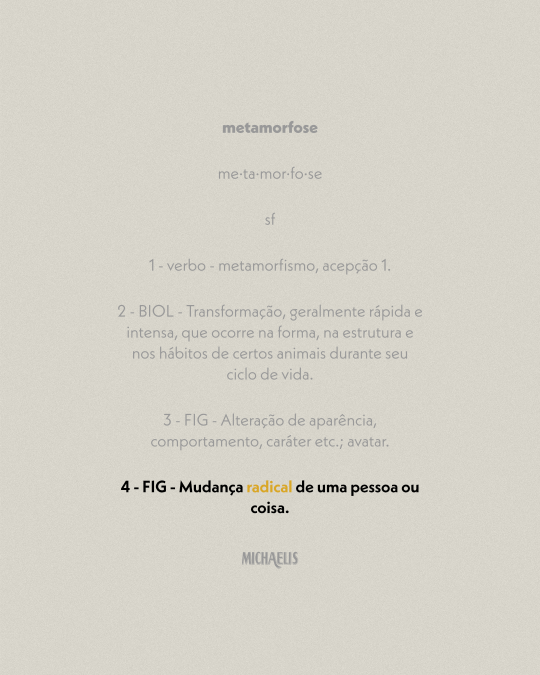
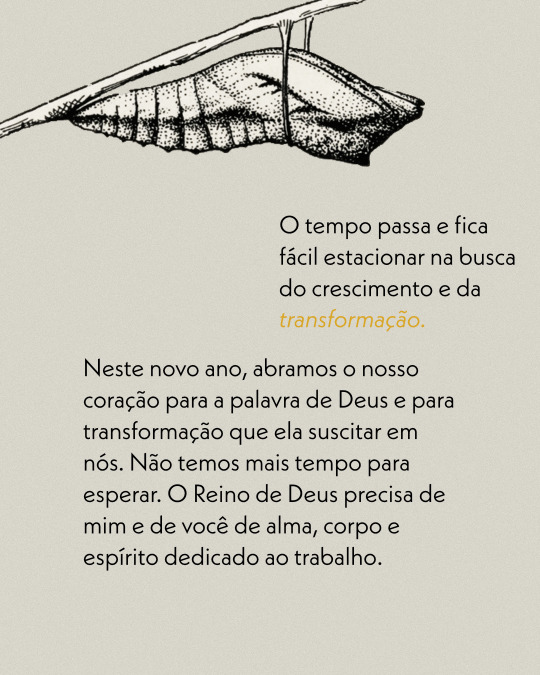

Carrossel de Instagram: O Ano da Grande Mudança
Em conformidade com uma abordagem de marketing de conteúdo, foi solicitado a elaboração do editorial e o design das peças de modo a garantir uma apresentação equilibrada e de fácil leitura. Contudo, foi primordial manter a vitalidade visual essencial para destacar o conteúdo em meio à intensa competição por atenção nas redes sociais.
[ENG]
Instagram Carousel: The Year of the Great Change.
In line with a content marketing approach, we were asked to draft the editorial and design the pieces in such a way as to ensure a balanced and easy-to-read presentation. However, it was crucial to maintain the visual vitality essential to make the content stand out amid the intense competition for attention on social networks.
#graphic design#design#art direction#typography#art director#branding#graphic art#content creation#marketing#editorial#editorial design#essay#design grafico#design graphique#digital design#instagram#social media#metamorphosis
1 note
·
View note
Text
Returning to Genesis
Personal essay written for Align Magazine
Written by Chloe Strickland
I. Genesis
The first lesson the Christian church taught me was obedience.
Honor thy father and thy mother. Love thy neighbor. Thou shalt not steal. The Lord detests lying lips.
In the beginning you are taught to be good.
I was raised Christian; I was baptized in the Nazarene church that my parents met through and were married in. My childhood was filled with memorizing Bible verses, sitting silently in rows of dusty pews, Sunday school, and prayer circles. I attended a Christian school until the fourth grade, and spent my summers at Vacation Bible School. Every waking moment of my childhood revolved around God.
Among the virtues Christianity teaches, the main one is obedience. To listen, behave, be truthful, be kind, and be good. And I was.
I was an obedient child. I was described as mild and reserved, and although I was quiet and polite like God wanted, it wasn’t out of sheer devotion, but out of fear.
There were countless nights when I was little where I would lay awake and weep not because of the monster that was hiding in my closet, or the fear of the dark, but because of the dread and terror I had about spending eternity in Hell. I would tally everything I did during the day that could be seen as bad or sinful and beg for forgiveness in my nightly prayers.
I would beg God to forgive me for everything. I thought everything I did was going to send me to Hell.
When my family switched to a non-denominational church, the fear didn’t go away.
This church praised enthusiasm, and the ones who showed the most eagerness for being at church were given the invisible badge of loving God the most.
At this point, I had been led to believe that being a good Christian meant to keep my head down and silently follow instruction, but I wasn’t being rewarded for that anymore. Now, I was being judged by how devout I was.
The workings of the world were explained to me as black and white, good or bad. All I knew was that I had to be on the good side, and this ideology was poison to me.
II. Rebirth
III. Reckoning
I was around seventeen when I stopped going to church regularly. The Church had stopped making me feel good. What used to bring me some semblance of comfort now made me feel worse every time I sat through a service.
At this point, my whole belief system was to be seen as and thought of as good. I did everything I could to fit the mold of a good person, but I was always left feeling empty— not good enough.
When the church taught me the fundamentals of being good, they also taught that people are inherently bad, but that we have the choice to be better. Although I hadn’t yet connected this to my religious background, this concept corrupted good and bad for me as a child, and as a teen and young adult, sent me into a spiral of self-hatred and low confidence.
I was no longer crying myself to sleep out of fear of going to Hell, but rather I was staring at the ceiling for hours contemplating my morality. I didn’t know how to be a good person when I was taught that I was innately bad.
I didn’t start contemplating my religious identity until I entered my twenties and was beginning to figure out who I was. This was where I struggled the most, actually. I had separated myself from Christianity and was trying to find solace in myself, but I only felt adulterated without religion as a foundation.
This inherent evil was looming over me and there was no way to cleave it from myself; I was stuck with it. It was this thought process that sent me into a spiral of unhealthy coping skills and depleting mental health.
This period of time forced me to rebuild. The structure that had been assembled for me to be a good person crumbled, and I had to dig myself out of the rubble.
Writing and literature were comforting to me at this time. I put my pondering thoughts to paper and allowed myself to question everything, even if it felt sinful in and of itself. I sought a lot of comfort in Transcendentalism and delved into mythologies from many cultures which taught me different ideologies of selfdiscovery and transformation.
Only after I gave myself the freedom to explore did I connect my childhood in the church to my conflicting identity. I started unraveling what I had been taught and how it polluted my perspective of myself. I didn’t realize how it subconsciously stayed with me or how my whole character had been twisted and molded to fit into it.
Once I identified the origin of my insecurities, I was able to correct my course, although it wasn’t as easy as it sounds. Even today I still struggle with the idea of if I’m a good person or not.
My whole childhood was built on the premise of being a good person. I was given the Bible, told to follow its rules, and when I broke them, confess my sins and ask for forgiveness.
My upbringing in the church gave me a lot of good things. It built my moral code and gave me good values to take with me in life, but it also built the foundation of a belief system that would become detrimental to my personal growth.
I don’t dwell on my religious trauma or the things in Christianity that I disagree with, rather I focus on my personal healing and growing away from the skewed perception of the world I was taught. I still believe in divinity and a higher power, but I believe a person could be good without it.
My experience with religion brought me more fear than peace. I strived for goodness out of fear that badness would damn me eternally, but really I was damned from the start. Until I severed myself from that fear, I found that you aren’t a good person just because you tell the truth, because you follow instructions, or because you’re not a thief.
What makes you a good person is yourself.
0 notes
Text
See that's the thing I love about this book. The above post is so firm and passionate about wanting to peel through the layers to get to The House and views all the abstraction as obstacles to that goal. I think that's a valid way to read the book.
It's not even remotely what I care about, though.
Don't get me wrong. Haunted House! An ordeal of Greek Myth proportions that pits man against man and serves to weigh the soul of Will Navidson and repair his fractured marriage? Sure. I love it. Cool.
What I love is that this book understands something that I hold true as a firm belief in my soul. Good art is both a means of sharing emotion and a mirror that we can see ourselves in. A good piece of art should be able to allow me to view perspectives unavailable to me in my life and bridge gaps in human understanding. A good piece of art that acts as a mirror should allow me to question my emotional reactions, to feel unalone in a world where I lack the language to communicate with others.
The ability to contain emotion within brush strokes and the printed word and audio vibrations and concepts is a gift.
I'm not the first person to take the view that House of Leaves is just a book. That's the solution. Nothing that happens within its pages is real. It's fiction. There is no solution. There's no purpose. It cannot be solved. Because it's fiction. It's an insanity simulator. Every layer of the narrative is impacting the next, infecting it with an obsession. Will's obsession with the inside of his house captivates the documentarian, the documentary captivates Zampano, Zampano's notes captivate Truant and though the editors don't insert themselves as the others do there is a lot of citation to go through.
Which leaves the reader. I have seen a large number of people just skip and focus only on the Navidson Record. I have seen people go over it multiple times to check citations and unpeel the narrative from multiple angles. You can check to see which citations are real or just treat them as a pretty set dressing and if you go the route of citations then you're down the rabbit hole because only a portion of them even lead anywhere.
Then you can chose whether or not you read Pelafina's letters at face value or if you decode them and read the layer beneath the layer and that will cause you to ask how much of Truant's story is true and how much is made up. If Pelafina's letters mention his Europe poems (written after she died) and Zampano (who she didn't meet?) you may start asking other questions.
You may listen to the album. You may ask why characters in the book are able to read the book that you are reading which is published and thus the words being written have been read by people written in the book and...

It's an insanity and obsession simulator, it's a mirror and it's just a book. You are literally the only person who has read the version of House of Leaves that exists in your head. Your experience cannot be shared. It's also a labyrinth with unlimited numbers of directions to read it. Start-to-Finish is not really an option. I doubt there's a human alive who has read every word from the start of the page to the end of the page from cover to cover. The book cannot be read that way.
For me, I read The Whalestoe Letters when the narrators offered me an opportunity to check the Appendixes. That means my view of Johnny (and his confession at the end) was painted by knowing about Pelafina. Many people would not have read those letters until afterwards. Many may never have read them at all. Even if they did, did they decode the hidden messages?
Plus, you bring your own baggage with you. I'm a traumatized kid raised by a single father who spent a lot of time in-patient at mental care facilities. Ignoring the direction one reads the book, the baggage you take in with you shapes your experience. I would never expect any reader to feel more connected to Johnny than the rest of the story. I know most people hate and skip his segments.
But hey, I saw ugly parts of me in that little twerp and I don't shy away when confronted by nasty reflections.
The beauty of House of Leaves in my eyes isn't trying to see The Navidson Record and put together the interesting story that is hidden behind layers of abstraction, it's a mind worm, a labyrinth that pulls you in again and again and leaves you alone in your own thoughts. Even in the book they claim that the House may be God trying to weigh a soul and put it on a trial that will allow the truest version of self to exit from the maze.
I like to think the book itself wants to do the same. But then again. The version of the book that exists in my head is unique. It's mine. After all. The labyrinth grows and expands as you explore it. Why would yours look like mine.
I just hope people are better on the other side of reading it and don't get lost in the endless traps and pitfalls and citations and insanity.
ok. Narrative obfuscation in House Of Leaves. It’s a relatively simple story about a man who moves into a house with his wife and kids, and the house is haunted. That’s it. The core themes are very transparent.
Except, that story is documented by a famous war documentarian, then published as a series of rare tapes, which are discoursed by film buffs, then interpreted from viewings and reading film critique by a blind old man, then his thoughts are transcribed into a manuscript by a series of young women, which is then compiled from scattered notes by the most mysoginistic, damaged, toxic pothead drop-out who won’t stop talking about his life, which is THEN edited and published by some vaguely nefarious agency who soberly refuse to provide any clarification or context.
It’s not simple, but there are so many different hands on the wheel with wildly differing opinions that you can’t discern the truth.
Johnny Truant is such a miserable hopeless fuck up. He has no sense of academic rigor or archival professionalism. Any interference he provides only muddies the waters and taints what would otherwise be a gripping piece of metaphysical film criticism. His neurotic rambling and personal anecdotes cloud an otherwise reasonable story.
If he wasn’t in it, if we could read Zampano’s manuscript directly, WE would be able to understand the truth. We would get it completely, and we wouldn’t have to encounter so much violence, so much miserable graphic detail. It would be a better story.
And fuck it, if we didn’t have to read all of Zampano’s tangents and analyses and interpretations, if we could just find a copy of the famous “five-and-a-half minute hallway” vhs, if we could SEE it, we’d understand. We wouldn’t need endless pontification of what Navidson and Karen’s marriage might entail, or recitations of what a director once said in a Rolling Stones article. We’d see the hallway itself, stretching out into what should be the backyard, and we’d get it. Hell, Zampano is blind in his old age. He can’t even watch the damn movie! But we could. We’d know instantly, the second we saw it. The impossibility of it, the gravity of it, the weight of that dark abyss.
And well, the VHS recording is a little dark, and the quality is poor, and maybe the white balance isn’t so perfect. And actually, VHs tapes could be manipulated. We can’t be sure that Navidson isn’t just using clever videography tricks to invent a hallway. If we were there, if we found the house (it’s in virginia, isn’t it? we even have the address). If we GO there, we could look down that hallway. And it’s dark, so if we just brought a flashlight, maybe took a few steps inside-
#camden posting#the word house in these tags is written in blue#also I am aware of the irony#I am editorializing and inserting my narrative onto the existing narrative#which is exactly what Zampano does with his Minotaur stuff#and Johnny does with his trauma#and the documentarian does in the way that documentaries do by crafting a narrative on top of the facts#everyone leaves their grubby fingerprints on the story#including me right here#media essays#though not my best commentary tbh
4K notes
·
View notes
Text
How to Quell Fear
quell - verb - to suppress (esp. an unpleasant feeling) Google.com
Whenever something unexpected happens, human nature presses us to dive head first into a pool of fear. Unfortunately, it is an impulse that is generally acted upon sans any sort of prior contemplation. The way the majority handles fear is either to stand and fight it or flee from it. But then there is the minority that refuses even to wade in the aforementioned cement pond for fear of getting mired in it. I can't help but reflect on F.D.R.'s huge capacity for common sense when he shouted into the microphone at his first inauguration in 1933: "The only thing we have to fear is fear itself." His ingenious quote has unlimited shelf life, especially when it comes to politics.
Without stating the obvious re: politics, I will say that here in L.A. county, quite a few people are drowning in so much fear as a result of the elections that they are relying on therapists and clergy members to offer them mouth-to-mouth resuscitation: advice as to how to quell it. Since I am close to both a top psychologist and an effective Presbyterian minister, I will share their solid suggestions with those of you who are still barely afloat, paddling around on a punctured floatation device in the deep end:
1. Upon waking each morning, take a series of deep breaths and then embrace the impetus to get out of bed.
2. Ignore the constant stream of notifications from The New York Times or similar publications on your smart phone.
3. Don't watch the news until you are doing #1 regularly.
4. Work out by running, walking, lifting weights, etc.
5. Search for a local Buddhist temple and take the monks up on their offer to guide you through a free mediation session.
6. Indulge in yoga or take a sound bath.
7. Concentrate on staying in the moment. Forget about all of the what-if's. Find a safe place and stay in it.
8. Call a friend whom you haven't spoken to in a while and talk about everything except politics.
9. Let go and let God because you should already know that historically speaking, Goodness tends to prevail in the end.
10. Do all of the above.
What you should not do is head to the liquor cabinet or your stash of Mary Jane for solace as they will only complicate matters or just kill you eventually. Temporary gratification is just that: temporary.
Times are tough, but we have all experienced challenges before. No matter what, we will get through whatever might happen.
#gwynenglishnielsen#spilled thoughts#good advice#blog#editorial#reader's choice#personal essay#writing community#writing#society#truth#cry of fear
0 notes
Text
A Democratic media strategy to save journalism and the nation
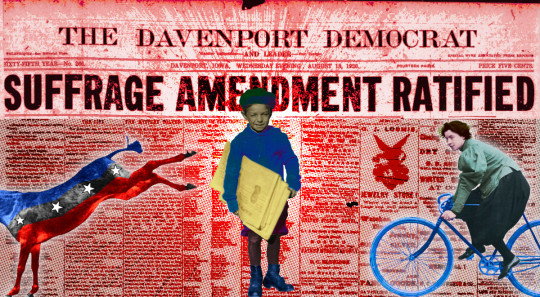
If you'd like an essay-formatted version of this post to read or share, here's a link to it on pluralistic.net, my surveillance-free, ad-free, tracker-free blog:
https://pluralistic.net/2024/12/12/the-view-from-somewhere/#abolish-rogan

As unbearably cringe as the hunt for a "leftist Joe Rogan" is, it is (to use a shopworn phrase), "directionally correct." Democrats suck at getting their message out, and that exacts a high electoral cost.
The right has an extremely well-funded media ecosystem of high-paid bullshitters backed by algorithm-gaming SEO dickheads. This system isn't necessarily supposed to turn a profit or even break even: the point of Prageru isn't to score ad revenue, it's to ensure that anyone who googles "what the fuck causes inflation" gets 25 minutes of relatable, upbeat, cheerfully sociopathic Austrian economics jammed into their eyeballs. Far right news isn't a for-profit concern, it's a loss-leader for oligarch-friendly policies. It's a steal: a million bucks' worth of news buys America's ultra-rich a billion dollars' worth of tax-cuts and the right to maim their workers and poison their customers for profit.
Meanwhile, the Democrats have historically relied on the "traditional media" to carry their messages, on the ground that reality has a well-known leftist bias, so any news outlet that hews to "journalistic ethics" will publish the truth, and the truth will weigh in favor of Democratic positions: trans people are humans, racism is real, abortion isn't murder, housing is a market failure, the planet is on fire, etc, etc, etc.
This is a stupid policy, and it has failed. The "respectable" news media hews to a self-imposed code of "balance" and "neutrality" that is easily gamed: "some people say that Hatians don't eat pet dogs, some people do, let's report both sides!" This is called "the view from nowhere" and it gets Democrats precisely nowhere:
http://archive.pressthink.org/2008/03/14/pincus_neutrality.html
Balance and neutrality are bullshit, an excuse that has been so thoroughly weaponized by billionaires and their lickspittles that anyone who takes it seriously demonstrates comprehensively that they, themselves, are deeply unserious:
https://www.techdirt.com/2024/12/10/la-times-billionaire-owner-hilariously-thinks-he-can-solve-media-bias-with-ai/
Press neutrality – the view from nowhere – isn't some eternal verity. In terms of the history of the press, it's an idea that's about ten seconds old. The glory days of the news were dominated by papers with names like The Smallville Democrat and The Ruling Class Republican. Most of the world boggles at the idea that a news outlet wouldn't declare its political posture. Britons know that the Telegraph is the Torygraph; that the Guardian is in the tank for Labour (and specifically, committed to enabling Blairite/Starmerite purges of the left); the Mirror is a leftist tabloid; and the Mail is so far right that its editorial board considers Attila the Hun "woke."
Writing for The American Prospect – an excellent leftist news outlet – Ryan Cooper proposes a solution to the Democratic media gap that's way better than the hunt for the elusive "leftist Joe Rogan": sponsoring explicitly Democrat news outlets:
https://prospect.org/politics/2024-12-12-democrats-lost-propaganda-war/
The country is a bleak landscape of news deserts where voters literally didn't hear about what Trump was saying he would do, and, if they heard about it, they didn't hear from anyone who could explain what it meant. The average normie voter doesn't know what a "tariff" is, and chances are they think it's a tax that other countries inexplicably pay for the privilege of selling very cheap things to Americans.
Ironically, this news desert is also a crowded field of hungry, unemployed, talented journalists. What if Dems funded free newsgathering and publication in news deserts that told the truth? What if these news outlets, by dint of being an explicitly partisan, party-subsidized project, refused to adopt all the anti-reader practices of other websites, like disgusting surveillance, intrusive advertising, AI slop, email-soliciting pop-ups, and all the other crap that makes the news worse and worse every day?
Cooper recounts how this was actually tried on a small scale, to modest good effect, when the Center for American Progress subsidized Thinkprogress, an explicitly leftist news outlet. This was going great until 2019, when corporate Dems and their megadonors killed it because Thinkprogress had the temerity to report on their corrupt dealings:
https://www.thedailybeast.com/thinkprogress-a-top-progressive-news-site-is-shutting-down/
And, Cooper points out, this isn't what happens with far-right subsidy news. Right wing influencers, personalities and writers can stray pretty far from the party line without getting shut down.
I love the idea of a disenshittified, explicitly political leftist Democratic news media. Imagine a newsroom whose purpose is to get its message repeated as widely as possible. It wouldn't have a paywall – it would be Creative Commons Attribution-only, allowing for commercial republication by anyone who wants to reprint it, so long as they link back to it. It wouldn't wring its hands over AI ingestion or whether a slop site that rewrote its articles got to the top of Google News. That's fine! If the point is to get people to understand your point of view – and not to attract clicks or eyeballs – other people repackaging your content and finding ways to spread it is a feature, not a bug.
Back in the Napster Wars, entertainment industry shills – like Hillary Rosen, who oversaw a campaign to sue tens of thousands of children before becoming a major Democratic Party power-broker – used to tell us that "you can't compete with free." That's not entirely true, but it's not entirely false, either. If your news is a loss-leader for a democratic society that addresses human flourishing and a habitable planet, then you can make that news free-as-in-speech and free-as-in-beer, and avoid all the suckitude that makes reading "real" news so fucking garbage.
For the past five years, I've been publishing a newsletter – this thing you're reading now – that has no analytics, ads, tracking, pop-ups, or other trash. As a writer, it's profoundly satisfying and liberating, because all I have to care about is whether people engage with my ideas. I literally have no idea how many people read this, but I know everything people say about it.
That's how the news worked back in the good old days that everyone says we need to return to. Writers and editors measured the success of a story based on how the public reacted to it, not based on clicks or metrics that told you how far someone scrolled before they gave up on it. The supposed benefits of "data-driven" editorial policy have not materialized – the "data-driven" part is the search for an equilibrium between how surveillant and obnoxious a website can be and your decision to stop reading it forever.
Outlets like Propublica have done well by adopting much of this program, albeit without any explicit leftist agenda (the fact that they seem leftist reflects nothing more than their commitment to reporting the truth, e.g., Clarence Thomas is a lavishly corrupt puppet of billionaires who've showered him with riches).
The fact that they've been as successful as they are on a national beat – and partnering with the scant few regional papers to do some local coverage – just proves the point. The Democratic Party doesn't need its own Joe Rogan – they need a nationwide network of local outlets, sponsored by the party, committed to never enshittifying, bringing relevant, timely news to a nation in desperate need of it.
#pluralistic#media theory#the news#democrats#democrats in disarray#uspoli#journalism#the view from nowhere#news deserts
567 notes
·
View notes